#because the writers hated mickey but audiences loved him
Text
there is something sooo fucking good about early seasons ian and mickey, about watching this summer fling turn into something more, the fear that elicited from mickey but him being unable to stop, finding those little moments hidden away and taking all this meaning from small gestures and persevering in dugouts and under bleachers and barely pressed confessions in the back of a church that is soo good for my brain
like i am very glad mickey gets to shout his love for ian from the mountain tops and also beat his love for ian into his dad's face but when he was clenching his teeth shut and his love for ian was coming out regardless ohhhhh baby i was eating
#shameless us#gallavich#and also they actually gave noel something interesting to work with instead of 5 mins of nonsense in the later seasons but. what can you do#like i watch later season stuff with like equal parts 'good for them i'm happy they are happy' and 'thats not my boy'#yes my man deserves to be out and happy and a bridezilla but also he would not act like that <3 hope this helps#yes he deserves to be a diva menace no he wouldn't do it like that though <3#yes he should get to heal from his familial trauma no he should not be forced to care for and interact with that man who should be dead#gallavich truly double edged sword of biggest win for fans and also biggest fumble#like ian's supposed to be one time hook up in s1 became his HUSBAND after years of bringing him back and sending him away rinse and repeat#because the writers hated mickey but audiences loved him#so yay they're married! time to have the most uninteresting plots for them imaginable & retcon some dumb ass traits on them for plot purpos#the last 2 seasons should have centered around ian and mickey becoming the centralizing force of the house that fiona was at the start#god there are so many tags here sorry. got more passionate about this than i thought i would#mickey milkovich
157 notes
·
View notes
Note
besides his relationship w amy which u have already established u dont find particularly interesting do you otherwise like rory? gen interested in what ur thoughts on him / his relationship w the doctor are !!!
as a character in a vacuum, separate from the role he serves in the plot, i would say i “like” rory superficially. i like dudes that are just some guy. some of his quips make me laugh (in LKH amy gets heated and tells him they need to look for clues to find river and rory makes fun of her accent and it gave me a singular chuckle during that godforsaken episode). i see how his awkwardness can be endearing.
his relationship with the doctor is interesting, because he's not so much his companion as he is amy's companion. (in an even more severe way than mickey and rose imo). he's perceptive, and often tells the doctor truths that he doesn't want to hear, like the harsh realities to the time travel lifestyle. there are moments of genuine friendship between them, and (espeically in s6) there's moments of antagonism both overt and subtle. especially on the doctor's end, i think he holds some well hidden anger for rory because of his connection to amy.
but there is something so fucking grating about rory that comes from his function in the story that is inextricable to his character. i hate that he's presented as the "correct" choice for amy. everything about being rory's wife strips amy of her agency. she loses her name. she becomes an incubator for his child. she lives in a dreadfully boring town that she has never fit into because it's rory's hometown. he's supposed to be the better option for her, but some people don't want to see hamfisted domesticity as the only acceptable endgame.
there's something insidious about his love for amy that comes more from the writers biases than what he was actually intended to be, i think. he's amy's childhood love, the only guy she's ever been with. they want the audience to think that rory "deserves" amy because he's just such a stand up guy i mean he waited for 2000 years! he defends her! doesn't this earn him amy's love? nevermind that he treats her like a possession. or that the life he offers her is not one that she wants.
sorry, i know you asked for my thoughts besides his relationship with amy but its so central to the character that i can't not talk about it.
#like as a guy hes fine i guess but hes not just some guy. he is a physical manifestation of the stars draining out of amy's eyes#rory hater for life unfortunately#also i'm so pleased people care about my opinions ty nonnie for asking#mailbox
12 notes
·
View notes
Text
The Road Movie
Most movies follow a general script type depending on genre, and this is used to tell a story that has a satisfying ending. It is interesting when a movie mixes up type and tone and goes against genre type. Sometimes it works. Sometimes it is terrible. Great directing and acting can make the subversion of expectations less jarring (or more depending on the end goal), but the end goal and tone allows us to attach a film to a genre. But what about films that aren't about the end goal? There are many films that are in a sub-genre that focus on the journey with little regard to the end goal. These are what are called "road movies" and can fall under many different genres since the end goal doesn't really matter. Let's address some famous road movies through the years that are also classified in a variety of other genres:
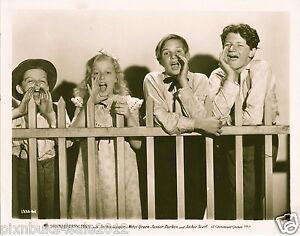
Huckleberry Finn (1931)
The OG of travel films, this was the sequel to Tom Sawyer (1930) and had the same child actors. This wasn't what you would call financially successful, but this was largely due to the Great Depression. The 1939 version of the movie did a lot better and was one of the well known films of child actor Mickey Rooney. This story of travel was an early role for many actors including Rooney, Ron Howard, and Elijah Wood. Although there were threats of death and portrayals of slavery, this film was considered a family adventure in the pre-code film era. I guess a boy escaping his abusive father in the company of an adult escaped slave where people are actively attempting to rob and kill them was considered a fun family romp in the early 30s. This was the same story that came from a book that was banned in schools during the 1980s. It is a great story and I love the works of Mark Twain; I am just surprised at the genre.
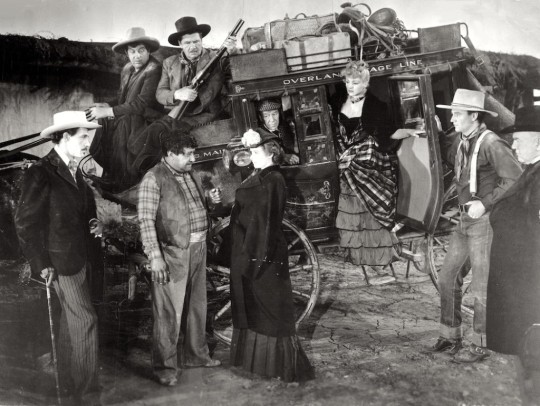
Stagecoach (1939)
This is a great movie that transcends the Western genre of which it is categorized. A group of people all have different reasons for traveling from an Arizona territory over to New Mexico. There is word of vengeful thieves and angry Apaches that threaten the small band of travelers. It is actually very intense because the threat feels very real throughout the film. The entire film focuses on the journey and the relationships forged (and broken) on the way. This was the breakout role for John Wayne and was part of an amazing string of films directed by John Ford and starring John Wayne.

Easy Rider (1969)
This is a film that really spoke to the hippie movement during the Vietnam Era. It is statement on how difficult it is to truly be free and how society fears that freedom and tries to destroy it. The film might very well have the worst dialogue of any movie I have ever seen. Actors Peter Fonda and Dennis Hopper were actively using drugs throughout film production, so the real draw was the sweet rides and the moving soundtrack. This is a movie where I actually want more driving montages and less character development because I don't identify with the characters at all. Maybe it is a generational gap.
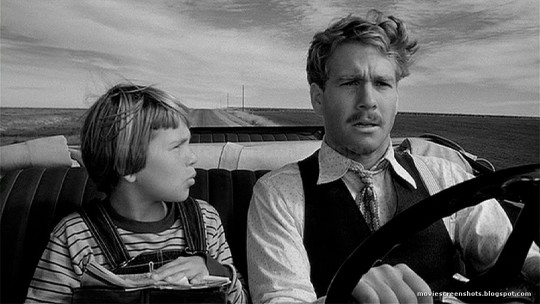
Paper Moon (1973)
This film is amazing. It is the story of a traveling grifter who takes a little girl on the road with him after her mother dies. He teaches her how to make a living cheating people and they form a father-daughter type of relationship. It is a comedy drama that won the girl an Oscar for best supporting actress when she was only 10. Some nice back story, the girl is Tatum O'Neal and is the actual daughter of the grifter, played by Ryan O'Neal. It is kind of strange, but this is a "coming of age" film on the road.
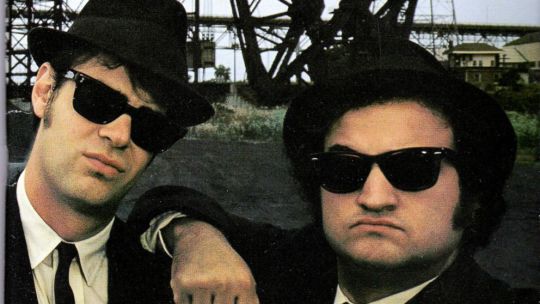
The Blues Brothers (1980)
Now this is what I am talking about. Two brothers go on a trip after being released from jail because they got a message from God. I am pretty sure that this film still holds the record for most crashed vehicles in a single movie. It is also interesting that the film is technically a musical. The brothers stop at different locations and songs break out. In between stops, they are chased by the police in an almost demolition derby style chase. I really enjoy this movie and believe that it really keeps a fast pace (literally and figuratively), but, like many road films, I can't say it is good because it is more of an experience than a story.
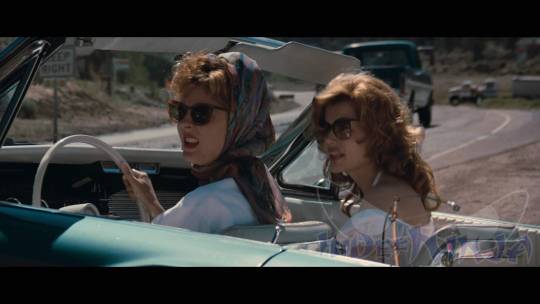
Thelma and Louise (1991)
This was an interesting twist on the "run from the law" type of film. Two women are friends and decide go on a weekend retreat. They get in trouble after killing a man who tries to assault them and have to run from the authorities. It has a reputation for being very feminist (despite being directed by accused mesogenist Ridley Scott) because of the negative portrayal of men. It obviously wasn't that bad since it was nominated for 6 Oscars including both leads for best actress. In fact, Geena Davis and Susan Sarandon were both nominated for best actress at the Academy Awards, the BAFTAs, and the Golden Globes. It is the quintessential road film since the end goal is constantly changing and best defined as "away from here."
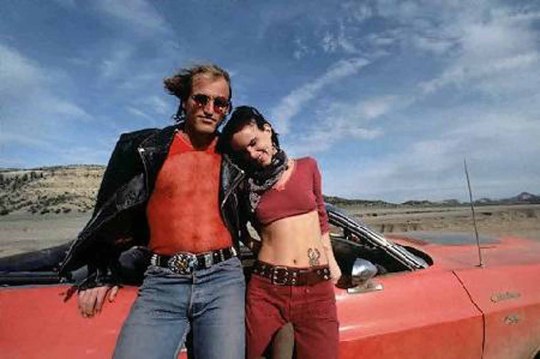
Natural Bork Killers (1994)
This was kind of a strange film. It is a crime drama where the audience follows two killers with traumatic childhoods as they meet and go on a murder spree. Similar to Bonnie and Clyde, but with gory murders as the focus over bank robberies. It is directed by Oliver Stone, and criticizes the glorification of violence by the media. It is most definitely a road movie because the end goal for the two is simply to be together and enjoy the rush of breaking the law. Hm. It is actually quite a bit like Bonnie and Clyde. Interesting. I would like to make a note that my mom hates this film because of the shaky cam and Dutch angles. It made her feel sick at the theater.
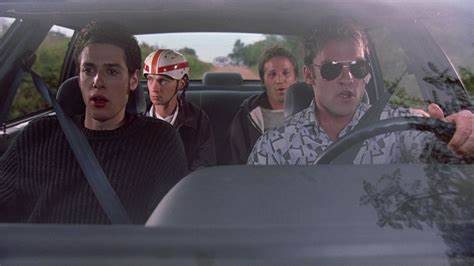
Road Trip (2000)
OK. This is far and away my least favorite film on this list, but it is the most famous "boner road comedy" that I am familiar with. It is a high school/college coming-of-age film that focus on the sexual pursuits of a group of young men. These types of films are marked with gross out humor, gratuitous nudity, and boys trying to have sex. There was a bunch of films like this that came out around the early 2000s and they all had to do with boys traveling some place in search of idealized sex (the plot on this one is a little different, something to do with a sex tape) and generally they find that the best girl for them was there by them all along. It takes a nice idea of character development and throws raunchy jokes and boobs at it. I was not a fan, but it was definitely a thing.
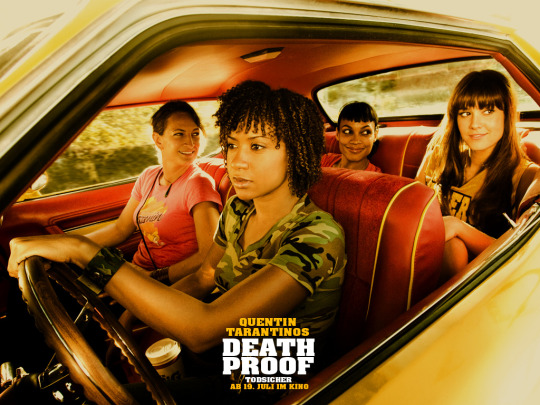
Death Proof (2007)
This is much better shlock. It is the Tarantino version of exploitation grindhouse films of the seventies, but updated to be a women empowerment film. It was part of a double feature that was paired with a horrific zombie outbreak film directed by Rod Rodriguez, but this one is much better on its own. It is the story of an old stunt man who travels around looking for unsuspecting victims whom he can run down in his indestructible car. This is a great example of what a road movie can be because Tarantino took the concept of a slasher and put it completely on the road.
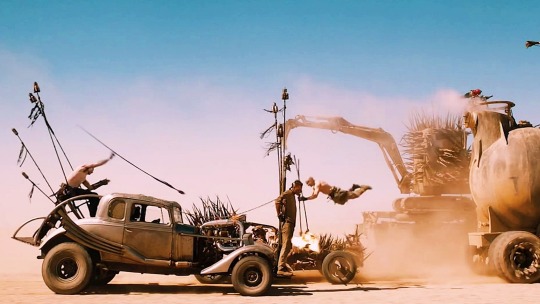
Mad Max Fury Road (2015)
Here is an action revenge film in a post-apocalyptic wasteland where most of the film is driving. The producers couldn't find a director who they trusted with remaking George Miller's Mad Max franchise so the 70 year old Miller said "hold my beer" and made this masterpiece that is arguably better than any of the first three (edit: I guess Miller always intended to direct but it took so long to go into production that he joked in interviews about giving up on it). The original trilogy with Mel Gibson presents an amazing world where most people are nomadic and traveling can be a life or death proposition. Fury Road is the further adventures of the character and his interaction with one Furiosa. The use of many practical effects on moving vehicles that was garnished with CG effects made for one of the best action films in the last decade. It was more than a simple movie about traveling; it was a land were the road was life and everything surrounded the ability to be mobile enough to get supplies in a dead world.
----------------------------------------------------------------------------
This is by no means all of the road movies. The Wizard of Oz is technically a road movie. The Grapes of Wrath is a critically acclaimed road movie from around the same time. Comedies like The Cannonball Run, Smokey and the Bandit, and National Lampoon's Vacation can all be classified in the genre. Rain Man is one of the best films of all time and it can be classified as a road movie. What it comes down to is that, when considering characters, a writer should think about the journey itself and think of how the leads interact with this entity. The road might be the best character in the whole story.
#road movies#thelma and louise#stagecoach#huck finn#mad max fury road#death proof#road trip#natural born killers#the blues brothers#paper moon#easy rider#introvert#introverts
207 notes
·
View notes
Text
Alright so a couple people said they'd be interested in hearing my Jimmy/Steve and Fiona thoughts so I'm going to put them under the break here. If you don't care, just keep scrolling.
I loved Jimmy and Fiona. He was far and away her best and most interesting boyfriend. Their chemistry was fucking unmatched. He was the only boyfriend who truly accepted and loved the kids. He accepted her for all her warts and issues. The way she loved Jimmy was a complete different level than anything she had with the sad parade of men who followed. And this is also where I say I absolutely hated every other romantic partner they had for Fiona. Well I didn't hate Mike he was a great guy but that was obviously not going to work out. But Sean and Ford were the most boring, useless, vile men. The fact that Fiona would give either of them the time of day is ridiculous to me.
The issue with Jimmy is that Shameless did that thing they do where they start sabotaging a character when the audience likes them and they're going to be written off the show (see: Mickey Milkovich x3). At least that's my theory, I wasn't watching the show at that time. I'm not saying Jimmy was perfect. He was incapable of being completely honest and was consistently creating shit shows for himself. But the big issue I had with the writers was when he was cheating on Fiona with his "wife." Jimmy had a lot of flaws and didn't always treat Fiona right but he would not have cheated on her. Especially with Estefania or whatever her name was. That was so random and out of character it just felt like we were being set up to start hating Jimmy. Then sure enough he's off the show a few episodes later. I'm not even mad he left (I assume that was the actor's call) but you don't need to make him start doing stupid shit for no reason because of that.
Then when they brought him back in season 5 he was just the worst. They did exactly what they did to Mickey in season 7. Made him the nutcase, unreliable ex-boyfriend who shows up and ruins everything. It all felt out of character and shitty. I did like the final scene with them, Fiona telling Jimmy they needed to let each other go, but that whole thing was like why did he even come back? Just to be the catalyst for Gus and Fiona (Gus sucked too, btw) breaking up?
But despite the writing issues seasons 1 - 3 1/2 I really loved Jimmy and Fiona. I felt like they needed each other and fit in all the right ways. They had issues, it's Shameless, but that was the only SO Fiona had that I ever rooted for. I always wished that when she left the show it could have finally been to go with him but the writers killed that one in season 5.
#sort of turned into a rant#oh well#my shameless thoughts#jimmy and fiona#what could have been if the writers werent assholes
14 notes
·
View notes
Note
To be honest I think a lot of the dislike for how Ian and Mickey were treated in s11 was that the low-stakes conflict had little to no substance, and it was left to the audience to decide why these things were happening. They never explain why Mickey spent the money or what happened to the job he had in s10. They deleted him trying to get a job for Ian and showing he wanted to put the effort it. When he goes to the job interview in 11x02, the scene is deliberately written to laugh at him and they don’t explore the seriousness of the very real difficulties he would have getting a proper job given his background. Of course one of the most disappointing things is that they deleted the kitchen scene that would give a little depth to their conflict in the beginning of the season and felt consistent with past characterization.
For me personally, it seemed every writer had a different interpretation of Ian and Mickey, and the way they act and respond to situations isn’t consistent throughout the season. 11x06 sticks out to a lot of people because they actually felt like multi-dimensional characters, and there was angst balanced with funny, sweet moments. I personally found it nice that they were dealing with a conflict together rather than against each other. Same with 11x08. I really like 11x10 as well because it felt very in character for the both of them, and Corina takes Mickey seriously which I appreciate. She doesn’t have anybody laugh at his feelings and understands why he would be reluctant to leave the Southside. The early scenes of 11x11 were really good but then he throws a tantrum and the piss in the pool comment was just weird…It just felt like the writers were laughing at him in those moments. I feel like they could have continued to lean into him not feeling comfortable in new environments after a lifetime of trauma instead of making fun of him for being “too poor” or “too stupid” to function in the West Side. That apartment manager was classist and patronizing, and yet the episode framed Mickey as being unreasonable and immature for being upset over it and had him throw a fit. As we’ve seen in past seasons, and the episodes of s11 that felt in character, he’s emotionally observant and knows how to handle conflict in a pragmatic way.
Overall, I don’t hate s11. There are things I don’t care about as much as a lot of people do. For instance, I don’t have a grudge against 11x07. I don’t mind that there aren’t big dramatic moments every episode and I liked some of the light hearted fun. I just wish when it came to the problems that they created, it was taken seriously. I don’t want to see Ian and Mickey in pain, but they’ve experienced so much of it in their lives, together and separately. That translates into how they would act in their marital issues but the show for the most part disregards it because they stopped caring about depth. It gave me the things I wanted to see for these characters, particularly Mickey, but the execution was disappointing at times. I’m so happy he’s free from Terry, not in prison, and he’s so successful, happy, and secure. It is just a shame some of the writers didn’t take him seriously.
Hey there, anon!
Wow, I really appreciate how much care and thought you put into this ask. And I'm going to try to put as much care and thought into my answer as I think this ask deserves, so I hope I do it justice.
Basically my answer to this is that I think this is incredibly valid, and in fact I actually agree with...pretty much everything you say here. I just came from a place of having low or no expectations, so I sort of just let myself enjoy season 11 for what it was, and I ended up loving it. That doesn't mean I wasn't disappointed in some things. The deleted scene from 11x04 is probably my most notable frustration with the season. It haunts me. It would have added so much depth and provided some context. The deleted scene from 11x01 of Mickey trying to get a job at the laundromat is something that I'm actually grateful they deleted, it just made me uncomfortable and I hated the no mask detail. The scene of him interviewing in 11x02 makes me cringe. Probably the most unwatchable Mickey moment for me all season besides his confrontation with the apartment complex manager in 11x11 before his poolside meltdown. So yes, there were things that I disliked or was uncomfortable with.
There are moments or details I often find myself meta-ing my way through before I start blaming writers for things, I think because I tend to want to stay immersed in the story even when I'm picking things apart. For instance, you bring up Mickey not having his job at Old Army anymore. I just figured because malls were shut down during quarantine, he was probably laid off. But some things that bug me seem to have no explanation that I can meta my way towards, such as Mickey spending the wedding present money. What did he spend it on? They live together, their bedroom is tiny, they spend a ton of time together. So how could he manage to buy all this "stuff" without Ian knowing anything about it? It just seems implausible. I chalked that one up to the writers. They left it up to the viewers to decide what happened, as you said, but they didn't really give us much to work with.
I agree with what you say about 11x06, 11x08, and 11x10. Those were great episodes. 11x07 is an interesting one, I don't hold a grudge against it either (do I open that can of worms? I loved that episode). 11x11 is tricky because it is a really interesting Mickey episode, and then...he's throwing a tantrum and tossing furniture into a pool. When I watched it I kind of didn't think anything of it, like some people just have shitty days and have a hard time working through them. He had a lot of built-up frustration by then, and while Mickey is emotionally observant and knows how to deal with conflict, sometimes growing frustration can make people snap. Even the most emotionally intelligent people can melt down. People aren't always going to deal with problems the same way all the time. And he'd been having uncomfortable moment after uncomfortable moment all day, so I think by the time Melanie was being a patronizing asshole, he'd had it. So he snapped. So it's not a great scene, but I found myself justifying it when I watched it. And interestingly, opposite from you, I saw it as framing Melanie as a jerk, therefore justifying Mickey's reaction. To me it looked like the scene was meant to have us sympathize with him while thinking she was an asshole. His reaction was still a lot though. As for the "piss in the pool" comment, I didn't take it to mean that he was going to like, be pissing in the pool regularly or anything. I took it as an indication that he was going to continue finding little ways to continue being who he is while living there. And maybe sometimes that means being like "fuck this place" and then literally pissing in the pool, who knows. I thought that was fine. But yeah, I didn't take it as the writers trying to convey that he's "too stupid" to navigate the west side. I think his conversation with Ian at the end of the episode about being uncomfortable and experiencing a lot of pressure while being there shone a little bit of a light on how his upbringing and his past has made it hard for him to know how to handle nice things. "Maybe I don't like nice." Maybe he doesn't know how to deal with nice yet. This isn't me trying to dismiss your concerns, by the way, this is just how I interpreted these parts of the episode.
"It gave me the things I wanted to see for these characters, particularly Mickey, but the execution was disappointing at times." That is the vibe, my dude. And I understand what you mean about the show not caring about depth anymore. I think they may have phoned it in a little for the last season, even though there were opportunities for some deeper explorations of some of the themes they introduced. But I'll always fly a flag for season 11 because it made me really happy and I think it gets an undeserved amount of hate, although it's true that it wasn't perfect. I think I've just chosen to approach it with an overwhelming amount of positivity because I loved watching it, I love them, I love being here, and I'm here because I want to have fun. Season 11 is goofy as hell. But I love it. I'm glad you were able to get some goodness out of it too, anon.
Thanks for coming to me with this. Feel free to hit me up any time.
15 notes
·
View notes
Text
The Golden Boy, John Garfield By Susan King

Stanley Kowalski in Tennessee Williams’ A Streetcar Named Desire was Marlon Brando’s signature role. It made the then 23-year-old Brando an overnight Broadway sensation in 1947, and he electrified movie audiences and earned his first Oscar nomination for the classic 1951 film version. But he wasn’t the first choice to play Blanche’s earthy brother-in-law. Producer Irene Selznick had her eyes on Hollywood star John Garfield, who frequently took time out from movies to return to the Great White Way for limited runs.
In fact, writer John Lahr reported in 2014 that on July 19, 1947, Selznick drew up a contract for the 34-year-old actor, “one of the few sexy Hollywood stars with a proletarian pedigree. The Selznick office leaked the big news to the press. The contract was never signed. On August 18 the deal with Garfield collapsed.”
One of the reasons bandied about was that Garfield turned down the role because the contract would have kept him away from Hollywood for too long. Though Brando is considered the performer who ushered in the more naturalistic style of acting (known as “the Method”) both on stage and in film, truth be told it was Garfield who was the catalyst for Brando, as well as Montgomery Clift, Paul Newman, James Dean and Steve McQueen.
Just look at Garfield’s first feature film, FOUR DAUGHTERS (’38). Directed by Michael Curtiz, the cast includes Lane sisters Lola, Rosemary and Priscilla, in addition to Gale Page as the four musically inclined daughters of a widower music professor (Claude Rains). Enter handsome boy-next-door Jeffrey Lynn as a budding composer named Felix who endears himself with all the daughters, especially peppy Ann (Priscilla Lane).
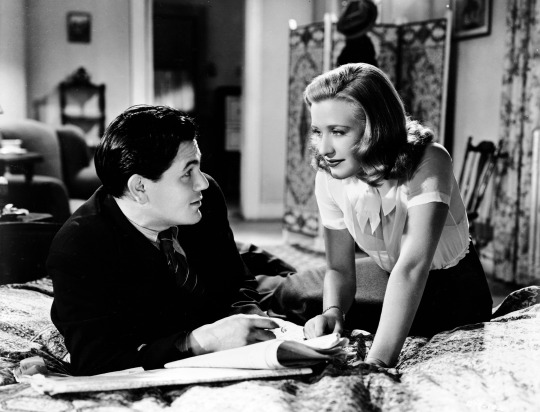
The household is put in an uproar with the arrival of Garfield’s Mickey Borden, the original rebel anti-hero. Unkempt, slovenly and possessing a massive chip on his shoulder, Mickey is an orchestrator who has arrived at the house to work with Felix. You can’t keep your eyes off him especially in this early monologue where he explains his anger to Ann:
“They’ve been at me now nearly a quarter of a century. No let-up. First, they said, ‘Let him do without parents. He’ll get along.’ Then they decided, ‘He doesn’t need education. That’s for sissies.’ Then right at the beginning, they tossed a coin, ‘Heads he’s poor, tail’s he’s rich.’ So, they tossed a coin…with two heads. Then for the finale, they got together on talent. ‘Sure, they said, let him have talent. Not enough to let him do anything on this own, anything good or great Just enough to let him help people. It’s all he deserves.’”
There was a sexuality and eroticism to Garfield’s performance that was 180 degrees different from Lynn’s durable and safe leading man. He was so natural; it was almost like someone found Garfield walking down the street in the Bronx and asked him to star in the movie. “He was the prototypical Depression rebellion youth,” actor Norman Lloyd told me about Garfield for the L.A. Times in 2003. They first met in 1937 and worked together on Garfield’s final film HE RAN ALL THE WAY (’51).
“He combined all of these elements of darkness and rebelliousness with the charm and the poignancy and he became the prototypical actor of that time. He never changed as a person. He remained just as a wonderful guy. He was a man of great charm, a good fellow, very likable.”
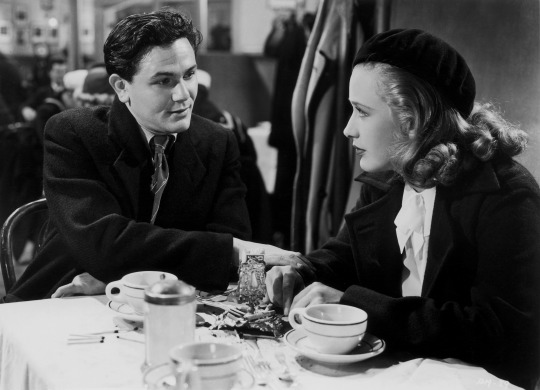
There was a lot of Mickey in Garfield, who was born Jacob Julius Garfinkle in 1913 on the Lower East Side of New York to poor Russian immigrants. Julie, as he was called, had a rough and tumble upbringing. His mother died when he was seven. “He hated his father,” his daughter Julie Garfield noted in 2003. “His father was awful to him. He was torn away from his brother.” In fact, Garfield once said that if he hadn’t become an actor, he would have been “Public Enemy No. 1.”
Unlike Mickey, the fates and destiny were looking after him. First, it was educator Angelo Patri, who became a surrogate dad to Julie at P.S. 45, a high school for troubled students. With Patri’s encouragement, he joined the debate team where he discovered he had a gift for acting. That was further nurtured when he received a scholarship to Maria Ouspenskaya’s acting school. He was all of 18 when he made his Broadway debut in 1932 in Lost Boy and became the youngest member of the progressive and influential Group Theatre, appearing in Clifford Odets’ early masterpieces Waiting for Lefty and Awake and Sing.
Odets wrote the play Golden Boy for Garfield in 1937, but director Harold Clurman decided to give the lead role of boxer Joe Bonaparte to Luther Adler and cast Garfield in a minor role. His unhappiness with Clurman’s decision pushed Garfield into signing a contract with Warner Bros. And FOUR DAUGHTERS made him an overnight sensation. He earned a Supporting Actor Oscar nomination, but lost to Walter Brennan who picked up his second Academy Award in that category for Kentucky (‘38).
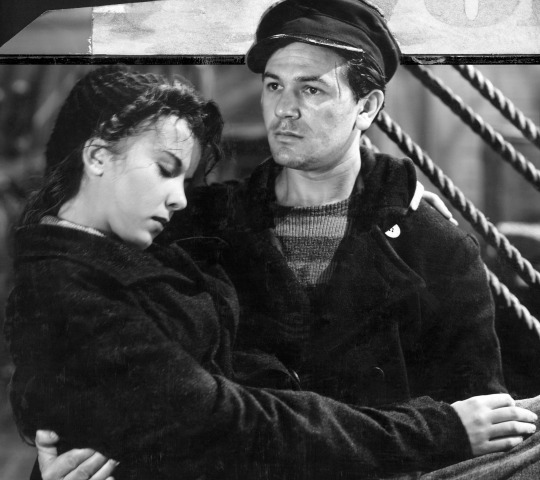
The following year, Garfield, Rains, the Lane siblings, Page and Curtiz reunited for DAUGHTERS COURAGEOUS, in which the actors played different characters from the prior film. It was probably the best film Garfield made that year. But Warner Brothers put him in a lot of movies that were unworthy of his talent including BLACKWELL’S ISLAND (’39) where he was typecast as a gangster. He made some good movies in 1941, including THE SEA WOLF, which also starred Edward G. Robinson and Ida Lupino and reunited him with Curtiz, and also Anatole Litvak’s atmospheric noir OUT OF THE FOG also with Lupino.
Because he suffered heart damage from scarlet fever, Garfield couldn’t serve during World War II. But he entertained the troops on USO tours and opened the famous Hollywood Canteen with Bette Davis so the troops could be entertained and be served by some of Hollywood’s biggest stars. Both Davis and Garfield appeared as themselves in the hit 1944 film HOLLYWOOD CANTEEN. Garfield also fought the global conflict on screen, giving one of his strongest and grittiest performances in PRIDE OF THE MARINES (’45), a poignant drama based on the life Al Schmid who was blinded by a grenade during the Battle of Guadalcanal. He returns home to his wife (Eleanor Powell) a bitter, doubting man who has a difficult time trying to deal with his new life.
The year 1946 saw the release of two of Garfield’s most enjoyable films HUMORESQUE and THE POSTMAN ALWAYS RINGS TWICE. HUMORESQUE was his last film under his Warner Bros. contract. It’s a delicious melodramatic wallow with Garfield playing a poor New York kid who becomes a famous concert violinist. Joan Crawford, coming off her Oscar-winning triumph in Mildred Pierce (’45), plays a wealthy patroness who sets her sights on Garfield. Garfield went to MGM for POSTMAN, which was based on James M. Cain’s best-selling thriller. Garfield turns up the heat with Lana Turner as illicit lovers who brutally murder her husband only to turn on each other when they are caught.
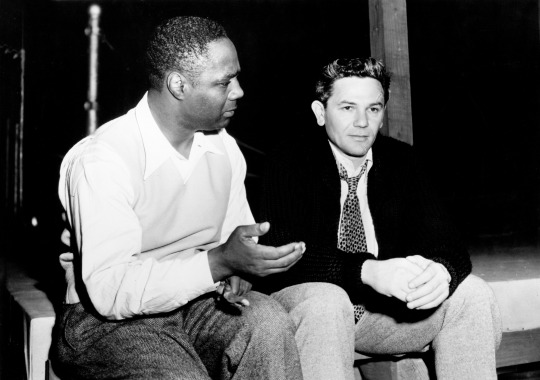
The actor teamed up with Bob Roberts to form an independent production company, Enterprise Productions, and their first feature was the boxing classic BODY AND SOUL (’47), for which he earned his second Oscar nomination as Charley Davis, a boxer who loses his way when he gets involved with an unscrupulous promoter. Not only does he have a strong chemistry with leading lady Lilli Palmer, but also African American actor Canada Lee as Ben, a boxer with brain damage. And Garfield gets to utter one of his greatest lines in BODY AND SOUL: “What are you going to do? Kill me? Everybody dies.”
Though his next Enterprise production wasn’t a hit, FORCE OF EVIL (’48), co-written and directed by Abraham Polonsky, is a terrific film noir with a hard-hitting Garfield as a corrupt attorney trying to save his numbers-racket brother (Thomas Gomez) from his gangster boss. Garfield returned to Warner Bros. and Curtiz in 1950 for THE BREAKING POINT, which was based on Hemingway’s 1937 novel, To Have and Have Not. It’s an outstanding film noir with a superb performance from Garfield as well as from Black actor Juano Hernandez who plays his partner on the fishing boat.
THE BREAKING POINT was Garfield’s penultimate film and was not a hit because The Blacklist was engulfing Hollywood and the actor, despite the fact he wasn’t a Communist. His film career was over in 1951 when he refused to cooperate with HUAC at his hearing. Before his death of a heart attack in 1952 at the age of 39, Garfield did appear in a short-lived Broadway revival of Golden Boy, which also starred Lee J. Cobb, a young Jack Klugman and Joseph Wiseman.
Though she was only 6 ½ when he died, Julie Garfield recalls seeing her father on stage in Golden Boy where he introduced her during the curtain call. “When he smiled at you it was like being in the sun,” she noted. “He was funny and sometimes he would like to dance and kick up his legs. I remember him adoring me. He used to take me to the merry-go-round a lot in New York. He was so strong, so handsome and he loved to kid me. He would give me this mischievous smile. I wish I remembered more about him…”
#John Garfield#Method Acting#Marlon Brando#Golden Boy#theatre acting#The Sea Wolf#Body and Soul#Four Daughters#Susan King#TCM#Turner Classic Movies#Huac#blacklist
82 notes
·
View notes
Note
hey gray! just wanted to ask what your opinion is on the hallway scene. i feel as if that scene was just another example of ian and mick resolving their issues by fucking instead of actually communicating. i mean, they did communicate in that couch scene, but when they did do the romantic stuff ian wanted to do, they just started fighting again. it’s also kind of hard to tell if that kiss was purely just passionate love or just them being horny, i don’t know..
different anon: You usually post something about the episodes after they air where you talk about what you think of them. What is your opinion on the Hall of Shame episode?
i’m usually all about meta and thinking about scenes and interpretations, but tbh, i’m just viewing all the HOS stuff as extra narrative that isn’t meant to develop characters and relationships, put forth storylines, or really do anything other than set up clip montages. because my take is that that’s just what it is. this presumably takes place prior to 11x01, and it’s sort of akin to a bonus feature rather than the main show, so it can be skipped by viewers and holds no bearing on the actual season. i don’t think it’s meant to give us a sense of progression aside from showing that now that they’re married, they’re making attempts to communicate, which isn’t unlike what we saw inklings of in 11x01. they still fight and f*ck, again, what we saw toward the beginning of season 11, and through it all, they love each other a hell of a lot.
mostly i’m coming at it from a viewpoint of, “this is a clipshow reviewing everything ian and mickey have been through over the past 10 seasons and we hired a writer to knit them together with 10 minutes of new stuff for the sole purpose of transitioning from montage to montage.” and i realize this is sort of simplifying and brushing it off as “unimportant to the narrative,” but idk, in my head, it sort of is. we didn’t learn anything new from it, and i don’t think we were supposed to.
with that said, i’m absolutely living for the video game scene and the couch/bath/mutual ily scenes, and i’m taking them as just cute stuff and evidence of two flawed people who need to shut up sometimes but who are genuinely making attempts to communicate and navigate the waters of their very new marriage while loving each other endlessly.
a lot of people are upset about the 87% thing, but i take that as nothing other than the writer trying to say that ian’s a loving person who is “soft” in that he feels deeply and still cares about the people he’s been with. not romantically, but he recognizes that they had an impact on his life. that’s so entirely normal that it literally doesn’t faze me. do i still have sentimental feelings toward people i’ve been with? of course. do i love my boyfriend more than anything? absolutely. ian’s mistake was just not lying. that’s kind of relationship 101, and he needs to learn that sometimes being super honest is the wrong thing to do. ian loves mickey forever and ever. he is his true love. he loves him more than anything he’s ever loved. he’s allowed to still feel sentimental toward the people who’ve impacted his life in the past. he just needs to realize that mickey has different life experiences than him--ian being the only person who’s ever had possession of any part of his heart--and may not easily understand the perspective of someone who has been in relationships with multiple people. therefore, ian just needs to either explain himself better or simply shut up and reassure his husband because i can imagine that from mickey’s perspective, that didn’t feel good to hear, even if it is a very normal thing. a little bit of pausing, thinking, and empathizing would go a long way there. i love ian so much, though. he’s just dumb.
i was bothered by the bipolar stuff--not because i think it’s ooc but because it was so clearly used just so they could show that specific montage, and i feel like they could’ve done it in a way that wasn’t so completely tone deaf. i did appreciate the way they joked about it on the couch later on, as i feel that’s both realistic and apologetic in a very ian/mickey way.
i hated the way whoever edited the montages clearly paid zero attention to context when choosing clips, making it seem like ian cared about the men he had sex with while manic (which is 100% not the case) and playing mickey’s full-on rape as part of a “who’s worse? terry or frank” argument. and i really wish they’d put in a montage focusing only on their loving/emotional moments accompanied by a slower song rather than all the songs being upbeat, mixing emotional comfort scenes with sweet scenes with sexy scenes. idk. the tone was so weird. all in all, i just feel like the episode itself wasn’t well put-together, even if it has its moments.
people are allowed to feel however they want about this, but viewing this episode with an understanding that this is 100% just meant to be a “here’s all the stuff that happened with ian and mickey over the past 10 years” show with a “plotline” that’s been pulled together for the sole purpose of transitioning between montages has allowed me to take from it what i want--which is the cute shit--and not worry about the other stuff. imo, the other stuff ultimately holds no bearing on the actual season in progress and means nothing in the scheme of future character and relationship development. if this clipshow was part of the regularly broadcast season 11 and was meant to have taken place after 11x03, i would care more about it in the grand scheme of things than i do, but it isn’t, and it was written as a bonus with the understanding that a large part of their core audience isn’t going to watch it. i’m good with my feelings toward it--caring about what i want to care about and ignoring the rest.
44 notes
·
View notes
Text
oops here are some thoughts on 11x08 regarding Frank and Terry’s storylines
Spoilers ahead
Please bear in mind that these are my thoughts and interpretations. I understand others may not feel the same, and that the themes in this episode could have been difficult or painful for some, nonetheless I’m going to delve into what I took from it.
I didn’t come into season 11 expecting to care about Frank but for me, his mental decline has been one of the most interesting storylines of this season, and arguably the most interesting storyline for his character throughout the show as a whole. What sticks out for me mostly is the care that the writers have clearly taken in setting up these final moments of Frank Gallagher’s swan song. This is a hard topic, it’s hard for viewers, who have developed a love/hate relationship with the man over the past 10 seasons, it’s hard for those who may have experienced loved ones suffering from dementia, and it’s a hard topic to write sensitively, especially for a character like Frank who has toed the line between villain and hero since day one.
But I do feel the writers are taking that care. It’s a slow burn, it’s not something that has come out of nowhere. It feels justified, developed, and with every episode we see those clues and those symptoms build and build and we know that there’ll be no lucky escape this time.
Frank has always had strong ties to his environment, he proudly belongs in the southside and that is heavily linked to his own selfhood, as we saw in 11x01 and his ramblings of the Gallagher’s history in Chicago (a questionable topic in terms of its accuracy). But that’s all being taken away from him. We’ve seen the gentrification of the south side, the threat of the Gallagher house being sold and now, in the latest episode, something so small as the renaming of a school is enough to threaten that wavering sense of his identity that Frank has been slowly losing as the series goes on.
Memory is a fickle thing, especially when it betrays you. The smallest things can trigger a stream of thoughts buried deep in the back of your mind and at this point, Frank relies on those triggers, because without them he ends up wandering the streets in the dark, calling out his kid’s names in a desperate attempt to simply find his way home. He talked fondly of his school days and, though he may or may not be fully aware of it, there’s a real fear that that’s going to go too, that he’ll forget.
If the school has a different name, what will ignite those happy memories again?
So he falls into his old ways, it’s political correctness gone too far, it’s a ploy by the woke millenials to specifically target people like Frank, to take away everything from him, to rewrite a history that he’s terrified he’ll one day forget and will be gone entirely. It’s a painful irony to watch his devout duty to remember battling against the inevitability of his regressing mind. Which is why, when it comes down to it and he’s standing in front of the panel of judges, we see that it was never about the naming of the school. It was about the memories he has, the ones he can still pick out of his muddled mind and share with a room full of strangers and about the responsibility we have to remember the past.
And when Frank says there are ‘Gallagher memories embedded in every inch of that school’, we see the hint at the bigger issue at play here. Selling the house, a place that’s much more befitting of that statement than an elementary school. Without it, will Frank remember his family? His childhood? Will he forget Monica eventually too? The house is the last rickety foundation of Frank’s memories, and I’m equal parts excited and anxious to see what path his storyline goes down should they sell.
Now Terry.
Terry’s was a story about closure. But this is Shameless, and we were never going to get a neat and tidy resolution. It’s gritty and it’s complicated which is part of what makes this show what it is. There’s a lot here that felt significant, though it’s hard to tell if it’s intentionally so or if, as a fan, I’m reaching as always to desperately explain every nuance of what we are given of Mickey.
The driving force of this episode is that Terry Milkovich fucking sucks.
We know that, have known that for 10 seasons, and Mickey knows that, but Mickey is in the unique position of being both Terry Milkovich’s son and the face of a people he hates. Though we all would have loved to see Mickey turn his back on him for good, I’m glad we didn’t.
Family is family, and that is something that has been ingrained into Mickey since he was a child. It’s something that’s been weaved into the show from the start, from Mickey defending Mandy from an alleged assault no questions asked, to Mickey’s brother’s helping him kill Frank, again with no questions asked.
This has been discussed countless times by people much better at words than I am so I won’t labour the point, but we’ve seen the strength of Mickey’s sense of duty, the agony it causes him and how he does it anyway. And in this episode, we got a glimpse at that relationship from both sides.
The exchange between the two of them ‘You’d have made a have decent son…’ Vs ‘You’d have made a half decent dad…’ felt genuine in a way I wasn’t expecting. Not much was said, and what was said was laced with insults but the intent was there. Terry, racist, homophobic, vile, evil Terry in an undignified moment of vulnerability in being taken care of by the person he tortured and abused, is forced to face that fact. I’m not saying he feels remorse, or guilt or anything resembling that, but he’s aware of the situation and he responds to it. All he has left are his scathing words. He uses them, Mickey fights back and they’re left at a ceasefire.
It’s an exchange that sums up their years of history, and the fact that they had that conversation together is so important to the closure of their story because it’s an acknowledgement. It’s Terry admitting that Mickey was useful to him, then and now, and it’s Mickey finally getting to say what he’s always wanted to his father, just the two of them, without an audience. We then see Terry open his mouth and we, as an audience, wonder for just a moment if there is going to be more, maybe Mickey does too until it’s clear that Terry is just ordering Mickey to continue feeding him, to continue to be useful.
It’s interesting that in this small gesture, we see that Mickey’s usefulness in the situation outweighs Terry’s hatred of him, something that’s never happened between them.
And I believe from Mickey’s point of view, he understood that that’s as close to an apology as he’s going to get. But I also don’t think he was looking for one. He said himself, he wants to be better than Terry, and every single action he’s taken since then has proved that he already is.
I think I would have loved if this storyline had been given the time that Frank’s has, if it had been built up gradually, rather than the show treating Terry like a cartoon villain who in later seasons just seems to come and go when necessary, and then trying to squeeze whatever moments of sincerity they could from Noel’s gut-punching acting choices. (The look on Mickey’s face at the end is one I won’t be forgetting soon).
The death was shocking. I’m still figuring out how I feel about it. But it’s interesting to see that it’s Terry’s evil nature that is ultimately what killed him. His racist attitude chased away the first two carers, he bullied and harassed them until Ian and Mickey were forced to find someone white in the hopes his attitude would be different. Had he not driven the first two away, maybe he’d be alive. I would say he was undone by his own fatal flaw, but that would be implying Terry deserves the fanfare equal to that of a Greek hero. Instead, it’s simply an evil old man finally facing the consequences of his actions.
As they say in Oz, ding dong, the witch is dead.
#shameless spoilers#11x08#TW dementia#TW death#Shameless#Frank Gallagher#Terry Milkovich#this got long oops
7 notes
·
View notes
Text
Lucifer 5x04 - The Mega Meta

This episode, the one all the cast and writers praised turned out to be the most challenging for the audience. Several hated it mainly for interrupting the flow of S5P1 whilst introducing a ‘weak’ story for Lucifer’s ring. Others loved it for all the meta, the concealed trivia and details that exist in that episode.
In my opinion 5x04 took it’s time to warm up to my heart and therefore today it’s time to write a meta on it. I’ll try to cover all the bases and if I miss something I apologise!
This meta will analyse, lines, settings, songs hopefully with the order they appear in the episode, as well as hints that it gives us for P2, the end of the series and many more things.
The credits open to Lucifer whistling as per Netflix’s subtitles ‘Chattanooga Choo Choo’
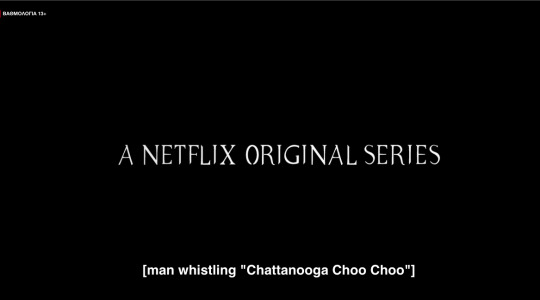
A song of about a man waiting for his train as he gets a shoe shine. The lyrics reveal at the end that a girl is waiting him at his destination and that he intents to marry her and settle... A good foreshadowing about Lucifer no? Especially after the S3 game night fiasco...
There's gonna be a certain party at the station
Satin and lace, I used to call funny face
She's gonna cry until I tell her that I'll never roam
By the way what’s this obsession over daggers and them killing people? Didn’t we have enough with the Flaming Sword in S2?

Trixie: Has it ever killed anyone?
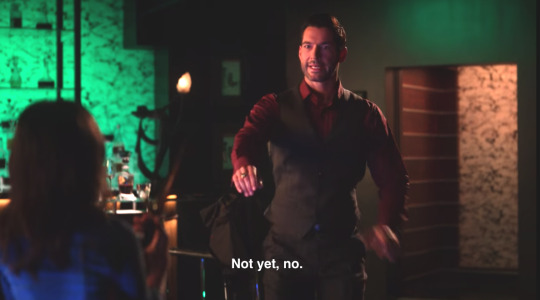
Let’s keep it that way kid... Although I doubt it.
Now take a moment to realise that Lucifer was in Hell for thousands of years. He hasn’t had sex since his relationship with Eve and for his last night on Earth he prefers to play a game of Monopoly with Trixie and only when she turns him down Lucifer suggests getting a drink at LUX always in her company. That’s progress...
It also busts all claims of Lucifer being a sex obsessed maniac.
The year is 1946...
WW2 is over and we find Lucifer in a new setting, a familiar one where through the episode we see that he has not just visited again but he is frequent visitor around that time. Just a few years later after all he was seen through Kinley’s photos in Nazi Germany. Now we know it was because apparently he owns a castle there, in the Austrian Alps... Not exactly in mint condition after the war though...
By the way the castle that corresponds to that 22 bedroom description Lucifer gives is Schloss Ernegg Castle which belongs to the same family since the 17th century and it’s in great condition. Actually it operates as a hotel!

The Hurry plays as we see Ellis strolling the WB New York area of the lot. Great old ones were shot there.. Like The Big Sleep (1946) staring Bogart and Bacall which was shot in 1944, reshot some parts in 1945 but was released after all the ‘proper’ war time movies were released first.
A bit like this episode The Big Sleep carries ‘process of a criminal investigation, not its results’. Also around that time we have The Killers coming out, The Killers is important to mention as aside from being based on a story by Hemingway who was in Cuba in 1946 not in New York as Lucifer claims, it was directed by Robert :. Siodmak made most of the Hollywood’s noir classics and was always faithful to the doomed attraction which would always resolve to a nihilistic conclusion... (Thank you wiki! :P)
The connection to Lucifer, between the lines and the off hand comments like Hemingway is that noir films were based on the German Expressionism in cinema, and one of the most prominent figure for the US was that one German director Robert Siodmak.
The purpose of the above information is in order to tell you that a black & whte effect and a crime story is not what makes a noir episode. The writers were faithful to the core of noir. Entrapment, flashbacks, narration. The tropes of murder, jealousy, backstabbing and crime is also there, easy to replicate after all for sure. A dead man walking and ‘selective’ amnesia is also convenient...
Triumph and tragedy can be found and lost in the maze of the cities and in questionable establishments... Like in bars...
Moving on!
The credits open and we listen to The Hurry Up played by The Heath And His Orchestra. Dear Heath was British not an American. A subtle nod to Ellis probably as the leading man. But here is the thing Heath was the performer not the composer of that piece. The composer was Kenny Graham (Again British) and probably that piece was written after 1958 but anyways it’s an inconsistency we (-I-) can certainly live with!
Lucifer and Lilith last meeting was at around 1770 (Marie Antoinette was born in 1755) now whether in Austria or France who knows.... I would assume that Lucifer stayed in Austria until WW2 as aside from the wars and other issues it had a great cultural field for him to explore such as literature, music and lacked the brashness of the new-founded then US (1776).
Tiny issue here... Moctezuma (The 2nd) who Lilith claims to have met died in 1520, a bit after Cortés arrived in what we know today as Mexico so we can assume that Lilith travelled between the New World and Europe until Lucifer found her in New York in 1946.
Lilith in a relationship with Tommy Stomponato who owned the club, she probably influenced him enough to name it ‘The Garden’ as se admits to Gertie later in the episode, she really loved that Garden hence why she took a small part of it with her.
Now the name Tommy Stomponato is directly influenced by Johnny Stomponato part and bodyguard of the Cohen Mafia boss Mickey Cohen. Now funny thing he was stabbed by Lana Turner’s (Hollywood star) daughter Cheryl Crane... That remind us a bit of Gertie as she yes both were stabbed by a woman but both were not prosecuted. The first as Lilith didn’t want Gertie to lose the limited time she had with her husband and Cheryl because she claimed self-defense.
The first time we see Lesley Ann as Lilith she sings ‘I want to be evil’ originally performed at the debut of Eartha Kitt and first released in 1953. It is considered brilliant for it’s feminism and ‘video clip’ starring Kitt...
youtube
It’s a song that carries Lilith’s agony which even Eve carried. The need for freedom, the need to break the chains of what they should be and what we see that even Maze carries throughout the series. It’s a song that reaffirms that betrayal towards God, Adam and Lucifer in Maze’s case is not an act of evilness but the need of these women to re-sculpture themselves without aid or instructions. In Kitt’s case it was social conformity. Also Johnnie Ray was the ‘guy who cries’ aside from his hit song in 1951 ‘Cry’ him crying after his wedding was received with mixed feelings I believe from the press and his fans.
Now we see that crime for Lucifer was fun and again he wanted to Laugh with Hemingway who again in 1946 was not in New York but had just starting to write his novel ‘Garden of Eden (published posthumously in 1986) and it explored the reversal of gender roles a bit like this Lucifer episode does.
So Lucifer accepts the case of finding the ring but needs help. Jack Monroe is the one that can help him and the name is inspired probably by Iowa’s born Jack Monroe Marvel character who lived in New York, fought the Nazi (See Jack talking about the Battle of the Bulge), sidekick to Captain America - in a way - and ended up shot and killed. The character had many cliche detective phrases. But that’s mostly a likely speculation :P
Now as Jack goes to talk to the ‘rat’ Lucifer comments on Gertie serving him a drink ‘Just what the doctor ordered’ an obvious connection to Harris playing Dr Linda.
A nice prop is the machine gun over the bar an alleged gift from Al Capone who had been arrested 17 years earlier and died in 1947.
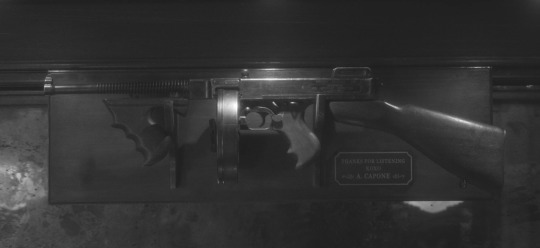
Thanks for listening, XOXO A. Capone
Now Lucky Larry who ends up dead is wearing an eyepatch probably a nod to another great director of noir films and of german expressionism in cinematography Fritz Lang.
At that point we have the talk between Lucifer and Jack concerning the laters problem with his wife. The story as everyone has noticed is a parallel with the issue that Lucifer and Chloe never begun on an equal ground. Someone had manipulated them and in both cases both parties suffered. Both men were manipulated by someone over them in hierarchy and both stood on a dilemma on how to proceed. It took Lucifer over 60 years to realise how difficult it was to leave and even then in 2x14 he returned.
As Jack and Lucifer get to Willy’s mansion all the paintings depict him as a great warrior in all possible eras. As Napoleon, Fritz of Austro-Hungarian Empire, Henry the 8th, Ivan, and that armour I believe it was from Carlomagne?
Also Hannibal crossing the Alps?
The little sausages are self-explenatory for the character and perhaps the lilies in his house a connection to the episode and the P1′s plot.
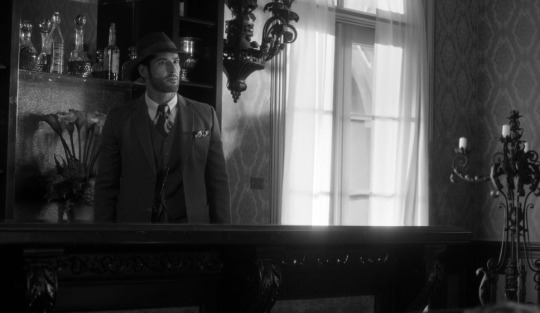
Lucifer checking the armour’s genital protector? Priceless :P As was Willy’s connection to Dan.
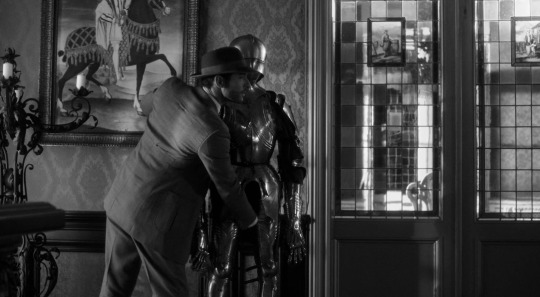
Now something that always make me wonder is why Lilith calls God Adam’s father as if she never considered him her own. At the same time she gives us a big hint there. She never walked away she was ‘sent’ away.
Gertie reveals there that her husband was wounded at the Guadalcanal campaign which ended in 1943 meaning that Bill was unresponsive for about three years at that point. The good news is that Bill seems to have been inspired by Bill Lentsch. Lentsch wrote a memoir called My Story and then adapted under the Title Hope For Wounded Warriors.
As a wounded warrior, Bill Lentsch knows the frustrating feelings of apparent helplessness and hopelessness. A sea-going Marine on the cruiser USS Vincennes at the beginning of World War II, he was a "hot shell catcher". The story of Bill's survival when the Vincennes sank is a story of miracles. In contrast, the story of his post-war rehabilitation and readjustment to civilian life, including a bad marriage {Sanoiro: At this point we have a differentiation but you never know}, contains more than its share of dark pages and the consequences of poor choices. Contemplating the option of murder, then suicide, was a vivid reality. Thankfully, the story of his later years brings hope and inspiration as Bill shares his personal journey of discovery.
Meanwhile the investigation continues. In the apartment we see pigeon cages a rather popular hobby back then in New York and not just for the messages they transported. Also do notice the WB water tower in the back. Iconic!
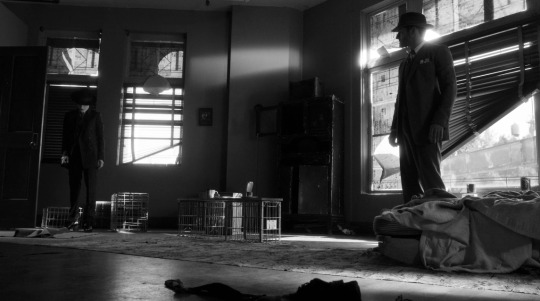
Lucifer finds a cuban cigar. Romeo y Juliet. The meta here obvious bit nonetheless important to our main love story.
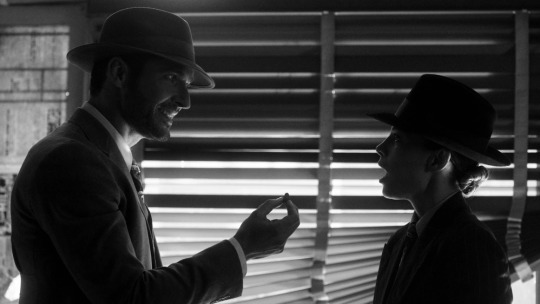
With Stomponato dead we have a chance to delve a bit to Egyptian mythology.
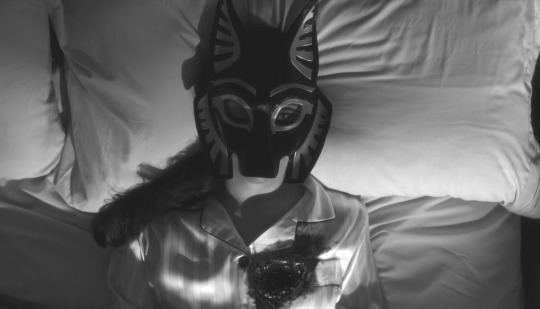
First the missing heart. The main organ that according to ancient Egyptians held the answer of how well you had done while you lived and what you deserved after death. It was measured and a conclusion sent you to afterlife or to damnation.
Second the Anubis mask. He was the God of Death who oversaw the heart weighting process. The colour black symbolised the Nile’s sand and thus regeneration as the river was a symbol of life. Anubis was adopted by Isis
Third the Eye of Horus. The Eye of Horus was used as a sign of prosperity and protection, derived from the myth of Isis and Osiris. This symbol has an astonishing connection between neuroanatomical structure and function.
That’s the basics but you can go further from there if you want to just remember that Egyptian deities hold an Ankh the symbol and work of life.
In 504 we learn that death is final, there is no eternal life. It cannot be given as a commodity, the ring cannot help so I would focus more on the stone itself and if Lilith’s immortality is used then it will not be used as it is in my opinion but more about that later on.
The shop sacred eye and the high priest take us back to two episodes of S1. First in 1x07 - Wingman where the high priest parallels the auctioner who was ready to sell everything of ‘supernatural’ worth knowing they were mostly garbage to make money. Second 1x12 - #TeamLucifer the satanic high priest who had said ‘-the Devil ain't gonna buy me an Aston Martin’. In 504 the High Priest wanted a Pontiac.
Lucifer comment on Tutankhamun loving the pre-sacrificed bloody heart might have to do with the Egyptian mythology that If a heart during the scaling was judged to be not pure, Ammit (female demon/god) would devour it, and the person undergoing judgment would not allowed to continue their afterlife journey.
One of the best lines delivered in this episode is also foreshadowing P2 in my opinion and why not some bts but not clear or definite ones.
In the modern age, we are taught to fear death. But the ancients understood that death... is power. - High Priest (Lucifer 5x04)
It is why I always say that death is not the last frontier in our series and as such it should be taken neither as the final chapter to an individual’s story nor as irreversible (with the right collaterals always) somehow. Although you cannot cheat death forever, this is the beauty of our story. Death is valued just as much as life.
As such as we are in the High Priest ‘office’ it is not accidental we see the Tree of Life (See my Tree of Life Meta *Here*). The designs are Celtic around the mirroring tree of Life in what we can assume is in Life and Death is as vibrant and ‘alive’ in both sides.
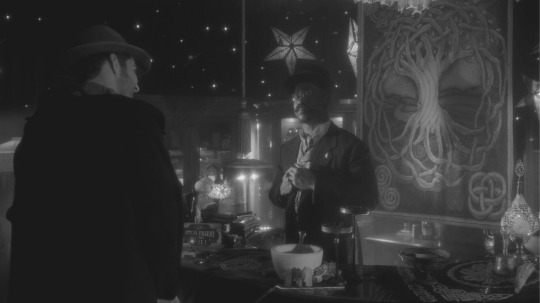
1) triskelion: meaning the three legs, is an ancient pre-celtic symbol that can be traced to the bronze era. It symbolises the holy trinity in Christianism but also the inner and outer world of spirits. As you can tell it holds a variety of meanings and even if it is just there, picked in random from the WB prop house we should note that it also symbolises the trinity of life, death and rebirth as well as the trinity of the transition of womanhood. The Triple Goddess: maiden, mother and the (older?) wise woman.
For this meta we will take the trinity of life, death and rebirth as well as elevate it to the transition of our lead characters. Chloe as a young woman, a mother and now a ‘wise’ older and more mature woman. Lucifer as the young rebel, a struggling with maturity and responsibility man and what he may become by the end of S5 without shedding any of his prior roles and identities. Only this time his identities no longer ‘stain’ him.
2) Knotted symbol - Eternal knot: We see them in many cultures and religions in Buddhism they represent birth, death and rebirth. In the inside we see Solmon’s Knot a symbol of immortality and eternity but some also parallel it to Lover’s Knot (See True Lover’s Knot), an ancient symbol of commitment and love. From this keep the eternal part of the symbolism which is often depicted in jewish cemeteries.
3) Celtic Cross: They are said to be based on some cases to the Egyptian Ankh (See Coptic Crosses), some also allege the design in the combination of the Christian cross and the pagan sun disk.
4) The Celtic Tree of Life: For this I take what is written in this site
The tree represents rebirth. Trees were said to guard the land and acted as a doorway into the spirit world.
The Tree of Life connects the lower and upper worlds as its roots grow far down while its branches reach high. The tree trunk connects both of these worlds to the Earth’s plane. It was with this connection of worlds, that it was said that people are able communicate with the gods in the heavens using the Tree of Life.
Tree of Life knots symbolize the branches and roots of a tree which are woven together with no end to show how the cycle of life is continuous.
Through the second part of the episode I was always looking at Lucifer’s tie. I might be wrong but it reminded me a lot of gears, with a heart and clocks on it. Essentially the clock is ticking... in more ways that one as well as for Lilith but give me some more lines before I return to this meta point.
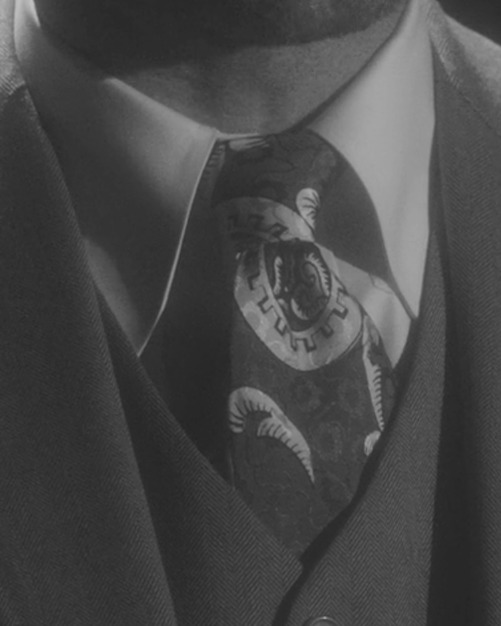
As Lucifer asks how humans believe her ring makes her immortal she ends her story with the line:
“I survive, and... somebody writes it on a stone tablet. You know how these things start.”
For me that was always a direct reference to the Favourite Son deal we had with the book in episode 2x17. As Lucifer said in 2x18 when Chloe asked whether his Dad said that Amenadiel was His favourite, Lucifer replies:
In so many Sumerian words.
Later on in S3 (3x14) Lucifer tells to Cain that Amenadiel is the favourite when he asks him as:
But the quick version: a book said it, so it must be true.
To be honest this re-occurring mentioning makes me hold to my belief that something was translated wrong there...
As the 5x04 sceheme to get the ring back is underway Lilith looks at Jack & Shirley’s interaction which is interesting not because it’s when Lilith starts to perhaps thinking of retiring her immortality but because a very special question comes to mind.
Michael knew the ring’s story. He claimed that he was the one who manipulated Lucifer into having his vacation, but his vacation just ‘happened’ to be at the same time Chloe was on Earth?
Here is a speculative meta.
Lilith asks Lucifer if he ever connected with anyone emotionally to which he replies:
Absolutely not. It would take a literal miracle for me to want something like that, and I'm fairly certain my father's not handing those out anymore.
It makes you wonder whether Michael was around listening, planning carefully his next moves. That that’s how he knew the ring’s story, or how he may have plotted Chloe’s miraculous birth by manipulating God.
At this point everything is possible but we should never forget that God at that point is still powerful and omniscience so Michael might be only alf of the explanation why Chloe is on Earth as a key for Michael to take down his brother and materialise his other plans. The other half is only known by God but will he be willing to share in P2 or even in S6 if he appears there?
Lesley-Ann as Lilith starts to sing ‘Someone to Watch Over Me’ a song written over the songwritter’s (Ira Gershwin) wedding anniversary, a true love song on many levels written in 1926 and featured in the Brodway Musical ‘Hey, Kay!’.
The musical’s plot is about an engaged womaniser falls in love with Kay and the song after lots of thought was placed to reveal to the audience of Kay’s realising that she is in love with the male lead, womaniser Jimmy.
We will never perhaps know if by imminence to Lilith’s first song lyrics, Lilith to a point was in love with Lucifer and held on to hope until she surrendered everything for a normal life not wanting to wait for the impossible. Of course that’s just one interpretation not a hard conviction of mine.
An analysis of the song writes:
When first composing this piece, the Gershwin brothers tried to capture the feeling of safety (and love) that everybody longs to have. The addition of the doll (a doll was added as the listener of the song in the rehearsals and stayed in the show) only enhanced the childlike, vulnerable side of the song that was being hinted at in lyrics such as, “I’m a little lamb who’s lost in the woods.”
Although many artists sing this like a love song, its first performance, directed at a doll, gave the piece an aura of safety not usually present in romantic songs.
Perhaps that safety should be also attributed here. Lilith still has her safety still holding on to her immortality knowing though that she will surrender it. Lucifer is unaware he one day will surrender his willingly because he fell in love.
In the end they both carry the vulnerability of needing someone to understand and love them. No matter how cynical we find both Lilith and Lucifer with his brutal Caligula orgy comments, they both crave about someone. Both have lost hope to their Shepard aka God/Dad.
Perhaps I’m wrong on my first impression with Lilith and her affection towards Lucifer. Perhaps they both are the prodigal children, lost in the woods wishing for someone to finally take care of them but no longer hoping for one, until Lilith takes the leap. Lucifer will need almost 80 more years and Chloe Decker to let someone take care of him.
Perhaps that’s why they do a duet on the lyrics:
Someone who'll watch over me
I'm a little lamb who's lost in the wood
I know I could, always be good
To one who'll watch over me
And the case is back to move the episode forward and enter the present Lucifer Trixie interlude and ‘Forget it Trix. It’s Chinatown!’
That line was the most obvious one as it comes from the more recent noir movie with Bogart and Chinatown (1974). In the movie aside from the mystery plot Evelyn - the mother eventually dies, the twist is that of an abuse which led to her daughter/sister’s birth and although that does not fit our serie’s plot the death of the main lady might. All a speculation so do not be dishearten remember all the above and this is not an S&S it’s a meta :P
After all Lucifer’s line goes back to the complex dealings in Chinatown and how understanding something fully is not always feasible.
Interesting is also how Lucifer shots, albeit the foot not the leg, of willy to prove Willy is not immortal. Like Chloe did to him in 1x04 and to Michael in 5x02. Jewelry is not going to save anyone. Big words but you know me. I believe in other provisions or actions even if they include the ring.
We all die, Lily. And that's okay. Truth is... I'd rather die today trying to save the man I love... than live forever without him.
The past, the present and perhaps the future?
The case is resolved and Jack follows Shirley to Des Moines (Capital of Iowa). That’s an inner joke as Joe Henderson is from Iowa and graduated from the University of Iowa.
Before Jack follows her remember that Shirley had asked more from him when he told her to be careful. A bit like Chloe in the evidence room in 5x08. If some have watched unconditional love then you might remember the scene where Kathy Bates tells to her husband played by Dan Aykroyd that him telling her ‘I love you was never a condition but at that point it now was. Similar to what we saw Chloe asking from Lucifer. A foreshadowing perhaps that eventually Lucifer will follow Chloe.
Now two things. Lucifer in episode 504 prepares their game night. He is now comfortable and even enjoying their game nights, he find himself right where he wants to be without being fearful of being dull. He is a shoe and that’s fine.
When Trixie asks Lucifer whether Jack and Shirley had a happy ending he tells her probably not as they moved to Des Moines meaning it was a boring move between New York and Iowa in general. Iowa and Des Moines have been used several times in jokes by the way due to Henderson.
Now back to Lucifer, at that point he does not see that sometimes sacrifices that lead to ‘boring’ lives are the best outcome and happiness is not equal to excitement but he is a slowly maturing Devil...
That part can help us to analyse the end of the story from 1946.
Lucifer says: Once you do this, there's no going back.
This implies that whether you surrender your immortality or gain it -for the second I’m quite doubtful it can be done on the same terms - it is forever. No going back.
Lilith’s next words reveal a broken woman who gets her Hail Mary and hopes for the best. As a parent she offered her children the best place to never realise they are lacking but Lucifer by bringing Maze to earth undid that as Maze slowly reaches her potential, learning there is a different way. God’s words echo since 3x26.
So was Lucifer a kindergarten guardian for Lilith? In a way yes but Lucifer in 5x04 understood Lilith’s logic. In their distorted image of how you can break an individual, the Lilims seemed safe from Lucifer’s and Lilith’s fates. Cast out, punished, unloved, lonely and in an unspoken despair to connect but too afraid to try again until Lilith tried again. The end of 504 showed she didn’t succeed o find what she was looking for. We have no way of knowing if we will see her again in P2 but it’s probable.
Lilith kisses Lucifer goodbye, making me once again wonder if a part of her did had feelings for him and wishes him back to enjoy the rest of his life as if somehow she knew, although she couldn’t.
The story ends here and perhaps the clock starts ticking for Lucifer through Michael. Perhaps the planning started with Penelope and John that were meant to be born, get married but not have children and then Chloe came along. But that’s just a theory...
And before the screen fades to dark, Lilith walks away with Lucifer standing in the middle of the street and we listen to ‘This Is Ours’ by Peter Sivo’s Band (1946-1961).
This is Ours lyrics are the words of a man which mystify me. For me it is a song that gives us a couple together after a very long time that reconnects. It was a meant to be couple but the past had to happen. He had to get married, for both of them to live apart their own lives until one day they get back together and now they can be together. There is no sadness, there is relief, contentment.
Several say that How I Met Your Mother had an awful ending. If you have not watched it and want to please stop here but know that I believe that the ending was just right.
In How I Met Your Mother, the lead (father) marries the mother of his children but it is revealed that she eventually dies and some years later he starts telling them a story that lasts ten years as all aspects of it in his belief is about how he met their mother. His daughter interrupts him saying that no it’s about how he met the woman he wants to be together now. They all know that the Mother was loved and was the One but in this life there is more, there are second chances because life happens and it’s not a bad thing and the time in between is as joyful as the future despite of the tragedies in between.
So a part of me wonders if Deckerstar will go a bit through that to a point.
Forget the past, for this is ours...
The thing is that a bittersweet ending gives as a possibility and then we are left wondering past that.
Trixie: I bet Jack and Shirley talked the whole bus ride and fixed everything.
Lucifer: Yes. Yes, perhaps they did.
After all they did move to Des Moines... After that we can only guess.
21 notes
·
View notes
Text
My god-tier Audrey Hepburn movies
I just realized I’ve technically seen all of Audrey Hepburn’s movies-- or rather, all the movies in which she was given star billing.
So, because I’m bored, here’s a list of my top ten personal favorites of her films. The criteria is simple: 1) she had to have starred in it, so nothing from her pre-Roman Holiday career counts nor does 1989′s Always, and 2) this is based on my level of enjoyment of the movie in question.
1. Wait Until Dark

Wait Until Dark possesses many merits, but Hepburn is one of its key strengths. For me, the most interesting performances are the ones able to balance seemingly opposing elements of the character in question. Here, Hepburn balances vulnerability with inner strength, insecurity and terror with courage, angry frustration with budding confidence. She makes her character seem like such a real, vital presence, like someone you would know. Also, having someone as sweet as Hepburn as the target for the cruel mind games and brutal violence of the villains makes the horror all the more terrifying.
Beyond her performance, this movie feels like it was tailor-designed to appeal to me: an intelligent and formidable villain, the everyday setting juxtaposed with a menacing atmosphere, scary scenes that don’t rely on gore, eccentric criminals, dark humor, a tight script without an ounce of fat on it. But you’ve heard me go on, so I’ll leave it there.
2. Charade
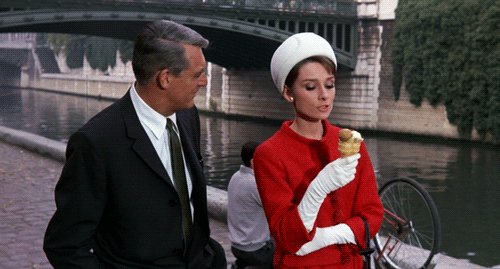
Charade is a prime example of how to mix suspense and comedy. The mystery at the heart of the movie is very clever, with twists and turns every other moment, constantly keeping the audience on their toes. Best of all, the film holds up after repeat viewings because of the delicious chemistry between Hepburn and Cary Grant, and the witty screenplay, which has such an elegant and tight structure that I seethe with envy as a writer every time I revisit this glorious thriller.
As in Wait Until Dark, Hepburn is concerned for her life as she’s terrorized by criminals, only here, they’re mostly more humorous in nature, sometimes even lovable (except Scobie, he can just jump off a cliff). She mainly gets to exercise her comedic chops, throwing off quips, sarcastic lines, and screwball banter with wonderful finesse. It makes me sad she never made more films with Cary Grant-- the two have a spark that belies the large age gap between them.
3. Roman Holiday

The character-building, naturalistic performances, and humor make Roman Holiday one of the best examples of romantic comedy. The film has both a gentle touch and a grounded maturity that make it more than just a remix of the earlier and quite similar screwball comedy It Happened One Night. To get a bit literary and pretentious, it reminds me a bit of Romeo and Juliet-- not because of the romance, but in how the movie starts as a standard screwball comedy and ends on a lyrical, wistful note you might not have expected.
Even though this was her first lead role in a feature film, I think Hepburn’s performance as Ann remains one of her strongest. Ann feels regal and dignified while also possessing the naivete and restlessness of a teenager on the brink of adulthood. It’s as fabulous a star-establishing movie as anyone could want.
4. How to Steal a Million
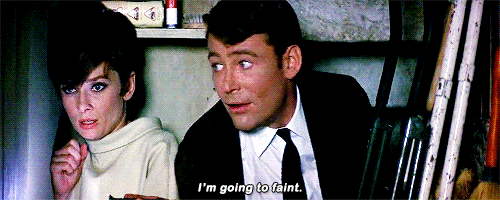
How to Steal a Million is pure fun. Not a moment of this caper comedy is to be taken seriously (which makes it the perfect quarantine movie if you need something to de-stress with). I always regard this movie as Charade’s even frothier spiritual successor: both films are playful, stylish, funny, and packed with romantic banter, plot twists, and colorful 1960s fashions. The main difference is that in this one, there’s no mortal threat involved and the humor gets a little more risque though not crass.
Also, how nice is it for Hepburn to be paired with a leading man closer to her age? Peter O’Toole was only three years younger than Hepburn when this was filmed. The two of them have glorious, cute chemistry.
5. The Nun’s Story

I hate the question of “objective best” anything, but if you put a gun to my head, I would say The Nun’s Story is features Hepburn’s most impressive work as an actress. For those who accuse Hepburn of being too affected, of being a mere clothes’ horse, here she is bare-faced, dressed in a nun’s habit, and playing a very reserved character whose dilemmas are largely internal. She plays her character’s spiritual conflict with an understatement that could only be considered skillful.
The film itself will likely be seen as “too slow” by most and there are a few colonial elements towards the Congo section that date it, but the film’s strengths, both from Hepburn’s performance and the mature way it presents its individual versus the system story, give it classic status. Few movies regarding organized religion are this balanced and lacking in propaganda, either for or against it.
6. Breakfast at Tiffany’s

While still Hepburn’s most iconic role, Breakfast at Tiffany’s gets called “overrated” a lot these days and fans of the original Truman Capote novella routinely dog it for making heavy changes to the source material. There’s also the, you know, gross yellowface a la Mickey Rooney that deflates every scene in which he appears. However, is the move bad? NO. It juggles zany comedy, tender romance, and rather heavy drama too well for me to consign it to the “overrated” bin. Blake Edwards was a fine director and this movie is one of his best.
And Hepburn gives a damn good performance as Holly Golightly, even if she is not the character envisioned by Capote. This character could easily be unlikable if played the wrong way-- she’s a “phony,” rather pathetic, and self-loathing despite her wit and charm. But rather than coming off as an unbearable loser, Hepburn’s Holly is a realistic, relatable loser we all love in spite of her own delusions and lashing out. She might even hit too close to home (or maybe that’s just me).
7. Funny Face

Funny Face took a few viewings to grow on me. It was one of the first Hepburn movies I ever saw (that was back in high school) and I was initially excited because it was directed by Stanley Donen who co-directed Singin’ in the Rain with Gene Kelly, a long-time favorite of mine. I expected this movie to be just as sublime and was disappointed when it didn’t hit that high mark.
Rewatching it later, I now find it very charming. It’s incredibly upbeat and relaxing, the sort of old-school movie musical that doesn’t get made anymore. Hepburn’s singing is a bit rough in the bigger numbers, but she is very sweet, a damn good dancer, and quite attractive to the point where she just takes my breath away. Fred Astaire and Kay Thompson are also wonderful and get a lot of great moments that show off their talent.
8. My Fair Lady
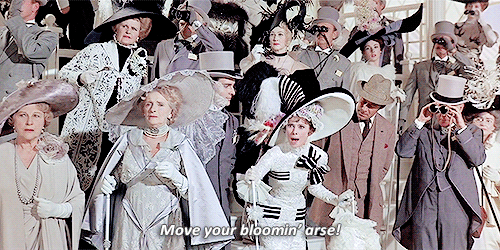
When considering what would go on this list, I was honestly shocked to realize how much I like this movie. I’m in the camp that considers Hepburn miscast, I find George Cukor’s direction rather stiff, and I really don’t like how the ending is changed from the original play. In spite of all this, I still really enjoy this movie for the songs, costumes, and what remains of Shaw’s brilliant satire on class and gender relations. Those three hours go by and the movie never outstays its welcome.
While I think Hepburn wasn’t the number one best choice for the part (I don’t really buy her as a crass flower girl in the beginning), she isn’t a disaster by any means. She’s still charming and sympathetic, and once she makes her transformation, you have to wonder how Higgins held it together, she’s so gorgeous. And I love the relish with which she approaches the “Just you Wait” song or the way she delivers the “move your bloomin’ arse” line at the races.
9. Sabrina
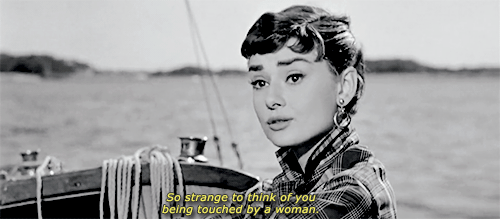
I think producers figured because of the fairy tale appeal of Roman Holiday, Hepburn would be perfect for this modern take on Cinderella, set in 1950s New York. Just like in Roman Holiday, Hepburn gets to undergo dramatic character development and show her comedic skills. It’s a cute movie, with a very charming William Holden and gorgeous black-and-white cinematography. It’s also shockingly uncynical for a Billy Wilder project.
About the closest thing this movie has to a flaw is Humphrey Bogart as Linus, the guy who Sabrina chooses in the end. This is a role Cary Grant could have played in his sleep, but Bogart clearly is not enjoying himself in some scenes. However, he isn’t movie-breakingly bad by any means. His character is meant to be a hidden softie and far more dependable than his handsomer brother, so I can buy that Sabrina would warm to him in the end.
10. They All Laughed

People tend to argue what the last “worthwhile” Hepburn movie is. Most argue it’s 1976′s Robin and Marian, while I’ve seen some go as far back as How to Steal a Million in 1966. They All Laughed, a Peter Bogdonavich comedy from 1981, gets my vote. This is a love letter to screwball comedies much like Bogdonavich’s 1972 classic What’s Up Doc, only with a far more melancholy edge.
Hepburn does not become a major presence in the movie until nearly halfway through. However, she approaches her role with a mature dignity that makes me wish she’d done more work along this line towards the end of her career. Her character comes off as an older, sadder Princess Ann from Roman Holiday. This makes the movie sound morose, but it isn’t: it ends with life going on and the characters accepting that with grace.
#lists lists lists#charade#roman holiday#how to steal a million#the nun's story#breakfast at tiffany's#funny face#my fair lady#sabrina#they all laughed#audrey hepburn#thoughts#wait until dark#old hollywood#i'll probably make more lists like these with other actors i like#so expect a buster post guys
124 notes
·
View notes
Text
All the new people in this fandom that say people who ‘dislike’ or ‘dont trust’ Ian are wrong, are so fucking annoying. Like don’t get me wrong, I LOVE Ian. I love him but I was so angry at him and very much hated him for a very long time and its not just because ‘uwu, he hurt Mickey’ as you newbies like to say, its because we as an audience didn’t know that Noel was coming back.
We didn’t have that luxery.
All we knew was Ian abandoned Mickey alone in prison and that was were Mickey was going to rot in canon for the remainder of the show. And the only mention of him was these fake comments from Ian to his newest love interest that made him sound like utter shit.
Then they desperately tried to claw back viewers by bringing him back for a couple of episodes in season 7, only for Ian to abandon him AGAIN this time alone in a foreign country... again we didn’t know that Noel would ever come back after this, so AGAIN we thought the last we would see of Mickey was him being heartbroken and abandoned... again by Ian.
So thinking that a character you LOVED kept getting these final scenes where he was just broken repeatedly by another character and that it was going to be the absolute last of this character’s arc... yeah its a hard pill to swallow.
Most of you have had the luxury of knowing that Mickey is back in Season 10 and is a series regular and oh look they got married. Yeah most of us didn’t have that. We had years, literal years of festering anger building up over how the writers fucked over Mickey and had Ian... IAN the guy who broke his heart, repeatedly bash his character and their history to his supposed ‘better for him than Mickey’ love interests. So... forgive me if sometimes I write a fic or make a post where Ian isn’t always in the best light.
#Gallavich#Shameles#Shameless US#mickey milkovich#Ian Gallagher#The newbies in this fandom need to get their heads of their arses
43 notes
·
View notes
Note
Not to start a whole discourse, but I happened upon your thoughts regarding Trevor and even though his character was pretty awful, just how rare it is for trans men to see themselves represented on TV. Trevor’s character was very flawed, he was written that way, but my dislike of Trevor isn’t because he’s a trans man, it’s that he ultimately wasn’t the right man for Ian. So I guess with Trevor it’s really don’t hate the player hate the game, but it seems like not a lot of people can do that.
Hello, anon! Let me start out by saying I am not trans, and am in no way trying to speak for or over trans people, but I welcome conversation around Trevor because I feel strongly about the importance of him as trans representation. I do disagree about him being awful, but I get it that not everyone is going to like the same characters that I like.
The issue I’ve had, that I was referencing in this post, is that I see a large percentage of the fandom completely dismissing him as awful without acknowledging the positive impact his character had on Ian’s growth, and more importantly, the importance of the character to the trans community, specifically trans men.
It’s completely okay to have a problem with Trevor’s character, I also have a lot of issues with the way he responded to Ian’s heartbreak over his mother and the way he dealt with Ian’s manic episode. I didn’t like how angry he got with Ian when he was earnestly trying to help Geneva. I also agree that Ian and Trevor didn’t really have great chemistry, and I don’t think they were right for each other. Those are all valid complaints! But there’s not a single character on that show that hasn’t done some fucked up shit, Ian and Mickey included, so it really rubs me the wrong way that Trevor doesn’t get the same pass that other characters do. I know that he wasn’t around for that long, so we don’t have the same attachment we do to the Gallagher siblings or Mickey, Mandy, Kev and V, but it’s really frustrating to see him constantly written off as The Worst Thing to happen to Ian, when he’s been so important to trans men who love the show.
Trevor’s introduction also exposed the show’s massive mainstream audience to a lot of information about the LGBTQ community that they may not have gotten elsewhere. The writers worked with members of the LGBTQ community on all of those scenes, and as a non-binary lesbian, I felt very represented, and was so happy to see Ian’s gay education play out the way it did. It may have felt clumsy in places, but to quote transgender writer/actress/activist, Jen Richards, “clumsy is better than nothing.” (thank you to my dear friend, Gabe, who lays out the importance of representation ((specifically trans men, who are so underrepresented in media)), clumsy or otherwise, in this fantastic video).
If you would like some input on the character from a trans man (which I am not), please check out this post.
#trevor is absolutely wrong for ian#but that doesn't negate the importance of the character and the storyline as a whole to the LGBTQ community#i also didn't touch on the things the fandom just completely gets wrong about him#but gabe does a great job addressing that in his post#trevor#shameless#ian x trevor#Anonymous
39 notes
·
View notes
Text
It drives me bananas when people say Kairi doesn’t do anything. Like, she brought Sora back to life from being a Heartless in KHI... her bond with Sora and Naminé is what creates the path so SDG can get into the Castle That Never Was (1:09:15 - 1:09:49 https://www.youtube.com/watch?v=qw-cmr34D3U&list=PL5bkYBlFL9xe9dk4RJgwUuLIDf8fFUkvn&index=20), she reunites Sora and Riku, her voice pulls Sora out of the illusion of Memory’s Skyscraper that Xemnas pulls him into (starting at 34:40 of this video https://www.youtube.com/watch?v=OUt8XEWpOKQ&list=PL5bkYBlFL9xe9dk4RJgwUuLIDf8fFUkvn&index=22), she’s what causes the Door to Light to open to get Sora and Riku out of the Realm of Darkness, does Keyblade War stuff and saves Sora’s life after he dies in KHIII so he can then save everyone (and before that--and after that--she fought Heartless, Nobodies, and Unversed), and now she tears Xemnas a new one, defeats Master Xehanort, etc. And, yes: that was a Re:Mind fix. But even before Re:Mind, she still Saved Sora, fought Heartless, Nobodies, and Unversed, and was pretty on par with Xion. And this isn’t even all the things I could list!
(And I want to point out that this next section isn’t me bashing any of these characters. I’m just trying to prove a point.)
Now, I seriously want you guys to think about this question... what have Roxas and Xion done for the world? Pretty much nothing? In Days, they were unknowingly helping Xemnas to destroy it! And after Xion learns this... she tells Roxas to set it right as she’s dying, and he tries to, but never does. Then in KHII, Roxas is living a normal life until he realizes he has to be reabsorbed into Sora and does it... and that’s pretty much it. Now in KHIII, they help in the Keyblade War in the eleventh hour, but that’s still not much.
Besides getting the Lingering Will to help the crew, and letting Mickey and Data Sora, I guess, know about the people needing to be saved... what does Naminé do, but fix problems that the Organization forced her to cause?
What has Vanitas done for the Realm of Light? And even if you don’t want a put it in a “for the sake of the world” but just a “in general” kind of way... what has he ever done, but lost every fight he’s ever been in, contributing nothing?
Besides helping with the Replica program in KHIII, I suppose, what has Ienzo done?
And yet all of these characters are fandom darlings, that the fandom adores while trashing Kairi because apparently she doesn’t do anything.
And I’m not going to lie and say that Kairi’s a better character than Riku, or that she’s done more than him, but in KHIII... they’re pretty much on par. Actually, Kairi may even be better. All of KHIII, Riku’s trying to save Aqua... but he doesn’t even accomplish this. Sora has to do it in the end. Kind of like how all of KHIII, Kairi trained... just to be kidnapped in the end. But Re:Mind gives justice to some of that... and even with that, she saved Sora in a roundabout way. Riku tries to sacrifice himself for Sora... but it really doesn’t do much. Sora still dies. He’s not the one to bring him back. Kairi is, and then Sora brings him back... But I guess if nothing else, Riku’s lines probably motivated Sora to keep going. And now Riku’s the leader of the group against the Norts... but guys, that’s still not much. Especially with what Riku’s done in the past.
Y’all’s problem with Kairi isn’t that she “does nothing”. It’s maybe that she gets limited screentime (and so far, really hasn’t been playable like everyone else has)... or moreover, that all of her potential as a character/human being has never been utilized. You guys don’t empathize with her as a character, that’s the problem. And I love her... but even I have to admit, there’s probably a problem... when after eighteen years, these writers have yet to romanticize her to the audience at all (though I also still say that some of this is fandumb. Kairi maybe said one problematic thing, where she joked about leaving Riku behind, and y’all decided to hate her forever for it). Another issue might be that more and more of her character’s being stripped away, so she can just be there to be Sora’s girlfriend, essentially.
But her problem isn’t that she “does nothing”. Even while in one of the least active roles for most of the franchise, she still did way more than most.
The issue is that Nomura refuses to see her as a human being--with differing interests and real emotions and reactions to things--and treat her like one, thus making her hard to connect with.
And I wish the fandom could articulate this. But they’re way too focused on “you can’t swing massive key at things a majority of this series? Then you’re useless!”, because all strength has to do with having to fight, I guess.
And here’s the problem with all of you screaming that Kairi never does anything... the developers are hearing this and listening. Which in some ways is great, because it’s what gave Kairi two great fighting moments in Re:Mind. But I think it’s the wrong issue to “fix”. Or rather, smaller compared to the other bigger one. Because we got these two Kairi moments in Re:Mind... but did she really get any lines to expand upon her character in the DLC? No.
This is why whenever I hear people say “Kairi does nothing”, I want to bang my head against the wall.
16 notes
·
View notes
Text
S10 Gallavich So Far
I keep waffling trying to decide if I want to bother to add any of my thoughts about the content we’ve gotten so far-we know that there’s very little continuity on the show, so all my little observations about what went down probably won’t count for much by the next episode, and certainly not once they finally stop wasting everyone’s time and let these poor bastards out of prison.
I guess I will say this much: I am sick and tired of the show treating the characters like they live in a vacuum and nothing that has gone before means anything and every script they start with a blank slate and do whatever the fuck they think will get them a laugh or be “shameless” or whatever. I’m specifically thinking of Ian acting like he’s never been around locked up criminals before. His request for a new “roommate” (and I’ll spare you my thoughts on them not having Ian use the term cellmate-hell, even “cellie” would’ve been more realistic) was just...hard to take. THIS is how we’re starting off finally having Mickey back? With Ian wanting to be away from him?
This isn’t “Ian hate”, this is me still being disappointed with bad writing that doesn’t make sense. If they could have shown or explained any of the crap they were throwing at the audience-why is Mickey suddenly at the breaking point with the mayo? Why is Ian unable to live in a small room with the man he loves when his entire life he’s lived in a room with 2 and then 3 of his brothers and at times even Frank and Mickey himself were in there too; when he’s lived at the Milkoviches with Mandy, Kenyatta, Iggy, Colin, Nika, a pregnant Svetlana, and a baby; when he’s lived in basic training barracks; when he’s lived in a squatter situation with Monica and her mother; when he’s lived in jail after being arrested for his Gay Jesus stuff? Yes, it’s hard to live with someone, anyone, even when you’re in love with them-but what does Ian think the alternative is? What does he think would be better by being put either in solitary (which has to suck or wouldn’t every prisoner be trying to get thrown in there?) or by being assigned to a new cellmate out of the general population?
The conversation with Mickey when Mickey says prison gets to ya, and Ian says he doesn’t want it to-that bugged me. It’s as if it’s somehow up to Mickey to make prison bearable for Ian, and Mickey DID that by getting himself locked up with Ian-now it’s on Ian to be the change he wants to see in the world, but the show is never going to look at it that way. Ian’s idea of “change” seems to be to get out there and, in the “singles cruise” mentality that Shameless has always treated his prison sentence, find someone new to make him happy again, at least for a while. He was organizing the sexual relations of the prisoners in jail, for crying out loud. Why doesn’t he seem to realize (or maybe he does?) that he’ll wind up being someone’s bitch-and more than likely pimped out for cigarettes and whatever else with his pretty looks if he risks not having Mickey covering his back? He talks to Chester about his prison wife-Ian knows what’s going on in the big house, even with the straight guys. Plus, he and Mickey have their own shiv, their neighbor has a shiv-prison is not a good place and half the time Ian seems to get that, the other half he “wants a break” and can’t take that Mickey seems to have the world’s most regular bowels and wants to take his chances on winding up with a guy who maybe takes 5 or more dumps a day at random times.
Sorry to go on like this-this is why I figured I shouldn’t get started, LOL.
I’ll sum up by saying a LITTLE bickering would’ve been okay-but since that’s all they let the guys do this episode it really started to bug me that they didn’t explain why. And that Ian seemed to forget all about when he went to ask “Mr. Milkovich” about prison and was told some hard truths and the rest of the conversation went like this: Ian says, “Rapings, food, guards-I can handle that shit. I just need to know…” Terry interrupts him. “Anyone can handle that shit. It’s the boredom that’ll kill ya…Start reading books, lifting weights...but you’re in the same place, with the same assholes, doing the same shit, every second of every minute of every hour of every day of every god damn year. If I was you I’d pack my shit and run.”
So WHY does Ian think things will be better for him outside his and Mickey’s cell?
And not for nothing-Mickey’s release from juvie the second time he was in there was delayed because he stabbed a guy with a spork and broke skin-wouldn’t that have made them pause and think that, at the very least, stabbing Chester would erase any chance of them being awarded “good behavior”, and beyond that, perhaps add to their sentences? The writers want us to believe they’re both that dumb?
#S10#Shouting into the void#Why do they make the characters forget all that went before?#Why do they think we want to see Mickey not being treated with the love and respect he's earned?#I won't even bother to ask why their sex scene didn't reach a satisfying end-sadly that WAS consistent for Shameless
12 notes
·
View notes
Note
How do you feel about the hate Ian gets?
I think some of it is over the top. (I've seen people hate him for really dumb reasons just for the sake of hating him. Which can get exhausting). But a lot of it is valid tbh.
My feelings about Ian are very....complicated. He was once my favorite male character on the show and I still hold some affection for him because of that. But at the same time, it's very hard for me to love or like him the same way after the way he treated and abandoned Mickey in seasons 6-8. (That god awful prison scene in 6x01 is especially triggering for me when it comes to my anger towards Ian. It was so pointlessly cruel.) And people bring up the "well, Mickey did bad things too!" arguement a lot but the difference is that Mickey grew, redeemed himself, and made everything up to Ian while Ian hasn't (and because these writers suck, probably won't ever.)
But the reason I can't fully dislike Ian is a combination of my old love for him and the fact that I'm very aware that the reason the writers wrote him like that is because they were trying to force the audience to let go of Mickey. We were supposed to be on Ian's side when he trash-talked Mickey to Caleb in S6. It was their way of trying to retcon Mickey as a character and Gallavich. But instead it just made the fandom very, very bitter towards Ian.
So....the conclusion to this is that I don't hate Ian, but I understand why others do lol. I think a lot of his actions towards Mickey in 5x12 and beyond was ooc but they are still unfortunately canon things that he did, whether I like it or not :/ I can only hope that they will fix it a little by having Ian treat Mickey well going forward.
13 notes
·
View notes
Text
Ranking the Marvel Cinematic Universe, Part 1
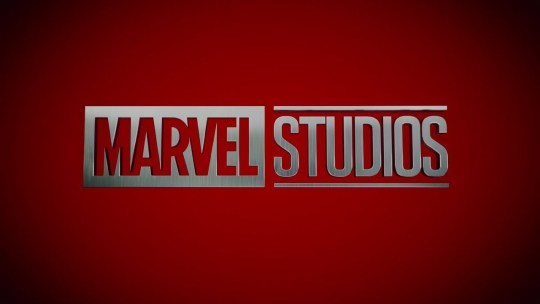
The culmination of the superhero ride that started with Iron Man back in 2008 is almost here. Avengers: Endgame tickets are selling out fast even though the movie is nearly three weeks away, and speculation as to how this stage of Marvel’s box office juggernaut will all end is at a fever pitch.
What better time to rank the movies that have brought us here?
Now, no one with even a tiny bit of objectivity sincerely believes Marvel had a ten year plan and executed it precisely according to a grand vision. Looking back through these movies makes it clearer than ever that, more often than not, they made it up as they went along. In fact, considering all the retcons, changed minds, dropped plot threads and unexpected surprises, it’s amazing the continuity holds together at all. It mostly does...but the bottom part of this list contains the few movies even Marvel’s PR team probably wishes they could have a mulligan on, as well as some good-but-not-quite-lighting-the-world-on-fire fare. Let’s get to it.
Warning: this article contains spoilers for nearly every movie in the MCU.
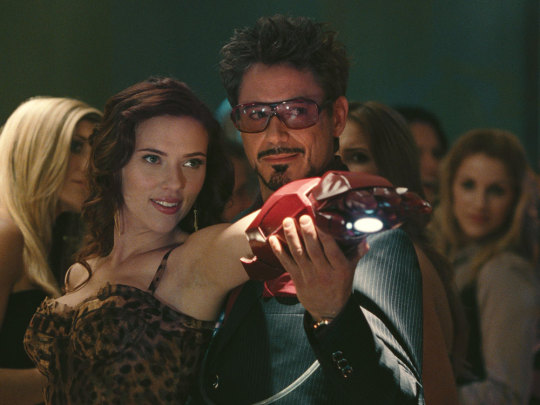
21. Iron Man 2
The red-headed stepchild of the MCU. After the surprise success of the original Iron Man, Marvel Studios apparently forgot that the strength of that film was allowing Jon Favreau and the writing team to put heart before brand synergy, and decided to make a movie that was half marketing for their planned Avengers crossover. Dropping Black Widow in here felt completely jarring, and it didn’t help that her role just added to the jumble of plot threads that didn’t seem to add up to anything; at the time, many saw it as proof that Marvel was putting a little too much faith in their ability to pull off this whole crossover thing. That’s only part of the sordid story, though, because the movie is also a mess in nearly every other way. Rather than the tight plotting of the original, this one sees Tony, Rhodey, Pepper and the rest speeding from random situation to random situation---a car race, an unhinged party, a spy caper---with only the barest of plot threads holding it all together. The movie’s only saving graces are the villains played by Sam Rockwell and Mickey Rourke. Each of them deliciously devours every scene they are in, providing the film’s lone moments of enjoyment, but they’re also squandered on what feels like an extremely low stakes plan. Iron Man so well proved that superhero movies can have a soul that it even managed to make some critical best-of lists for 2008. The sequel made us wonder if that might have been a tad premature.
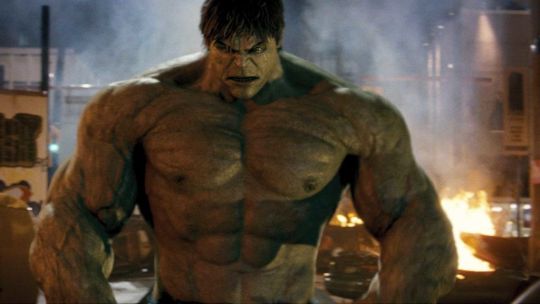
20. The Incredible Hulk
There are some genuinely creative moments in this action-oriented “apology” for the in-reality-pretty-good Ang Lee Hulk movie. The opening sequence showing how Hulk’s blood travels, a chase through a Brazilian favela, tossing Bruce out of a helicopter to incite his other half, and the almost-love scene aborted by the alter ego were signs of how clever the movie could have been if it were not focused on cramming in as much smashing as possible. Nick Nolte’s complex antagonist is replaced with William Hurt chewing a little too much scenery, the new super-villain played by Tim Roth is a dull waste of the actor’s talent, the finale is listless, and the entire movie is just one long excuse to show Hulk ‘roiding out as much as possible. The camera work of skilled action veteran Peter Menzies Jr. and some excellent CG on the title character make it more fun to look at than many of the tights flicks of the time, which is something. As a general rule, things that are made to chase fleeting audience sentiments don’t stand the test of time, and there’s been a quiet reversal since 2008 in which Lee’s more original and creative vision for the character has come to be re-evaluated, while this one has been almost forgotten and relegated to endless TNT re-runs. Maybe with Mark Ruffalo having one more movie on his contract, he’ll get a crack at doing it right post-Endgame.
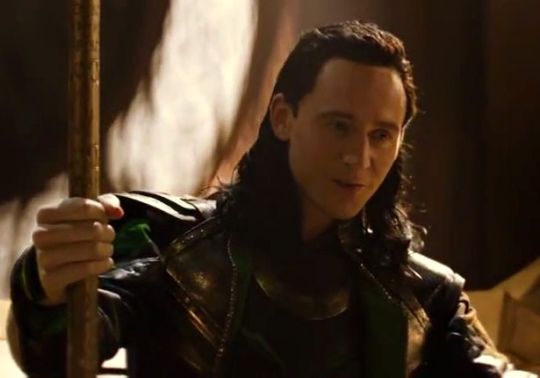
19. Thor: The Dark World
At the time, this movie served as iron-clad proof that the only reason the Thor character worked at all was Loki. The god of mischief is at his delicious then-best here, conniving from a prison cell, partnering with his brother out of genuine concern, and eventually managing to actually take the throne. Sure, that latter development was quickly undone in the next film, but what a parting shot. He’s the only aspect of the movie that fully works, and if you pop it in today you sit patiently waiting for his scenes and snoring through the second, Loki-free half of the movie. Thor himself is lifeless when Loki’s not on screen. The Warriors Three are still nowhere near the right balance of humor and bravery. Natalie Portman remains wasted on a supposedly genius scientist who can nevertheless be stunned into immediate silence by Thor’s golden locks, while Sif is still 100% unnecessary in every way. Perhaps worst of all, the underrated Christopher Eccleston is miscast as a villain who always seems to be doing bad Shakespeare. We all tried hard to forgive it at the time (and director Alan Taylor claims it was made “a different movie” in the editing room, not at all implausible) but thankfully we’ve since admitted this is mostly a misfire.
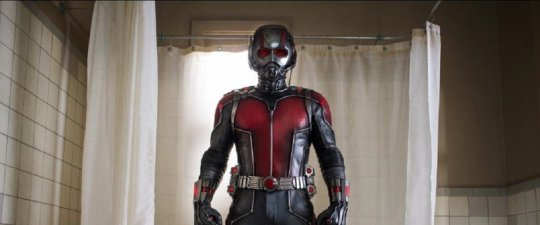
18. Ant-Man
If you were to judge Ant-Man entirely by the size-changing shenanigans, it would be one of the best Marvel movies. Peyton Reed, building off a script by departing director Edgar Wright and Joe Cornish (and tidied up by Rudd and Adam McKay) gets a ton of mileage out of the novelty of being the size of an insect, from outrunning a flood in a bathtub to that rather brilliant final confrontation in a child’s playroom, using toys as ammo. Further, Paul “I Am Immortal” Rudd is pitch-perfect in the title role, while Michael Douglas and Evangeline Lilly bring a lot to the picture. It’s in the details where Ant-Man falls a bit short (pun intended). To start, we have a single major Hispanic character in the MCU, played by the frankly more-legendary-than-you-think Michael Pena, and he’s reduced to a fast-talking stereotype. Judy Greer and Bobby Cannavale are also worlds better than their roles, which are, respectively, a cliche shrewish ex-wife and a cliche over-suspicious cop. What really drags things down, though, is the lackluster villain, who may be the most inert black hole in the MCU’s rogues gallery. He is neither good enough to engage us, nor bad enough to hate. He could have been played by a grip, for all the personality he’s allowed. The core of the film is delightful. The hill around it is crumbly.
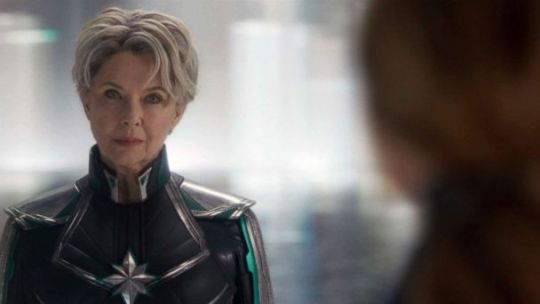
17. Captain Marvel
Marvel’s first female-led flick is understandably a phenomenon, pulling down the sixth-largest opening weekend of all time and serving as inspiration to young girls and target to the kind of people who don’t want women in their clubhouse. So what about the movie that’s causing all this hullabaloo? It’s pretty decent. The movie can be summed up very succinctly as “safe”. It takes few chances and is more like one small step than one giant leap for womankind. Had it been released during the early superhero boom, it would still be fondly remembered as a major link in the genre’s evolution. As it is, it borrows from the buddy-cop subgenre to create what is essentially an adventure/sci-fi movie between Carol Danvers and Nick Fury. It stands out more as a callback to the kind of action pics made in the 90’s (when it is set) than the heavily marketed shared universe of the MCU, and includes standout performances from Annette Bening, Jude Law and Ben Mendelsohn. It meets expectations; it does not exceed them, and if you are a fan of the distinctive style practiced by directors Anna Boden and Ryan Fleck, you won’t find it here. It’s only a month old, and it may be too soon to definitely say how it will be seen as time goes on. Right now, it feels more like a solid first step for the character than a fully realized final destination.
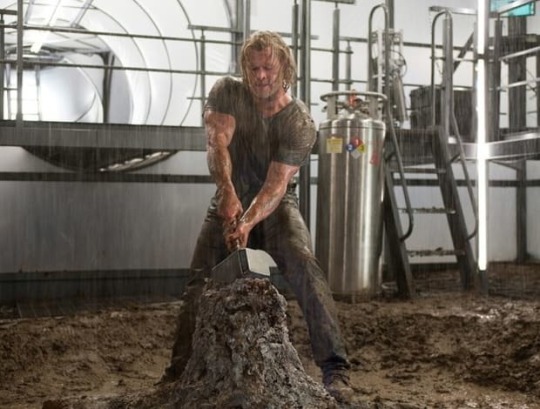
16. Thor
The original Thor has some completely solid, indisputable charms. Chris Hemsworth does physical comedy much more skillfully than he is ever given credit for, it is the debut of Tom Hiddleston as Loki, the third act is a rare-at-the-time case of inventiveness in an MCU finale, and it’s always great to see Stellan Skarsgard in literally anything. I would watch two hours of Stellan Skarsgard eating lunch, with a clone of Stellan Skarsgard. His drinking scene with Thor is a seriously underrated bit of awesome. It helps make up for the fact that the movie has no idea what to do with most of the supporting cast, including in part Loki, who at this stage seems to flail around between personalities, having crazy forced on him in time for the final duel despite it not even being hinted at earlier. It’s as if director Kenneth Branagh just let him do his own thing, and Hiddleston’s not 100% sure what that should be yet. The mirror scene is objectively amazing, but he won’t really come into his own until Avengers. The Warriors Three are utterly wasted; Branaugh and the writers just never nail the right combo of comedy and camaraderie needed to pull them off. Sif is superfluous. Natalie Portman is one of the finest actors of our generation, here reduced to goggling over Thor’s pecs. It’s not bad, especially compared to some of the dreck that gets pumped out of the blockbuster machine. It’s just rather inert.
That’s it for part 1. I’m going to be doing some Marvel/Superhero/General Nerd content leading up to Endgame’s release. Check back next Friday for part 2 of this list, and pop by Monday for part 1 of my predictions on the fate of each character in Endgame.
Part 2: https://ryanmeft.tumblr.com/post/184208179827/ranking-the-marvel-cinematic-universe-part-2
Part 3: https://ryanmeft.tumblr.com/post/184372777282/ranking-the-marvel-cinematic-universe-part-3
#marvel#robert downey jr.#chris hemsworth#Captain Marvel#movies#brie larson#Scarlett Johansson#kenneth branagh#edgar wright#thor#ant-man#peyton reed#Adam Mckay#joe cornish#avengers endgame#avengers infinity war#stellan skarsgard#Natalie Portman#tom hiddleston#anna boden#ryan fleck#Annette Bening#ben mendelsohn#Paul Rudd#judy greer#Bobby Cannavale#michael pena#christopher eccleston#mark ruffalo#Ang Lee
8 notes
·
View notes